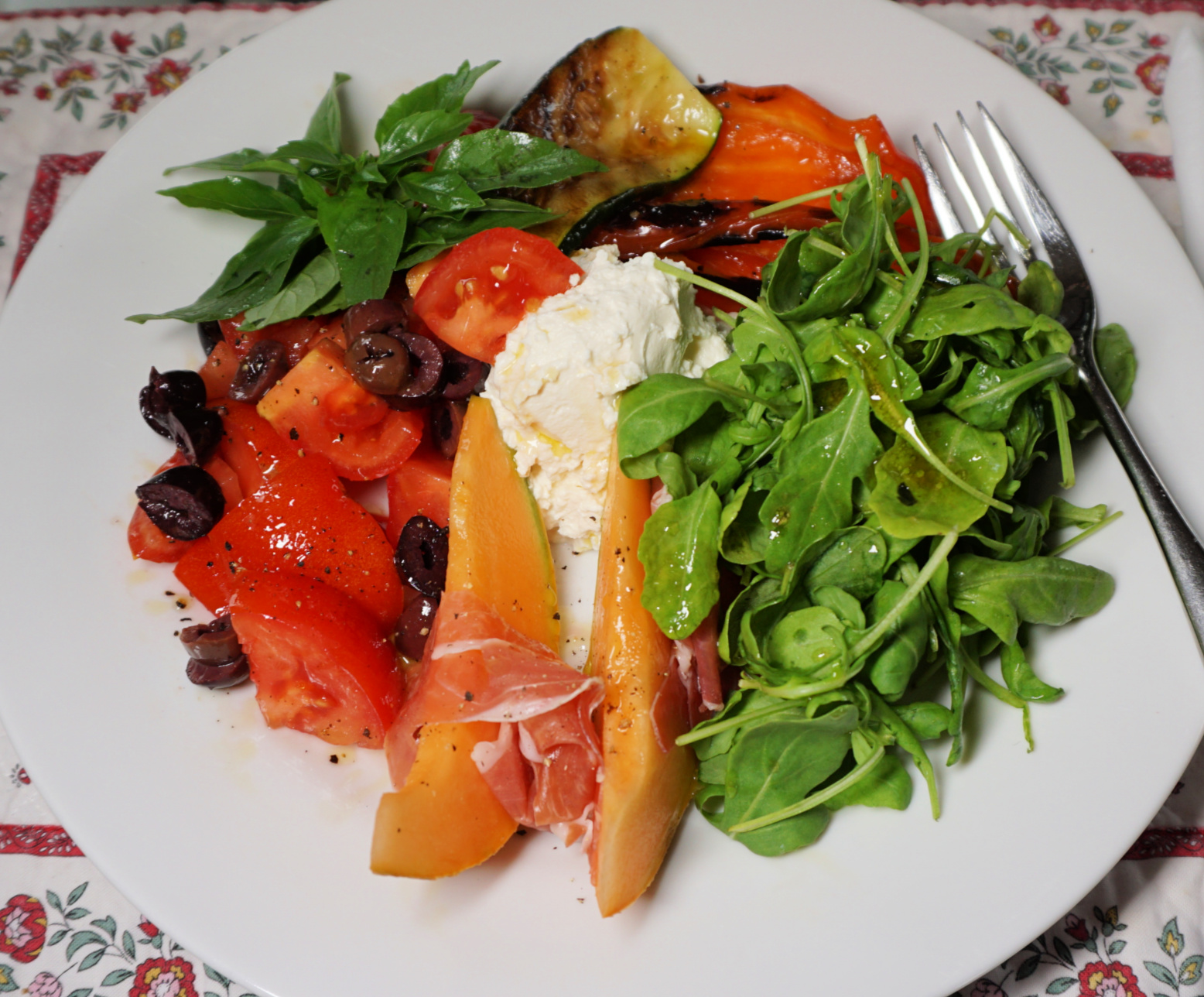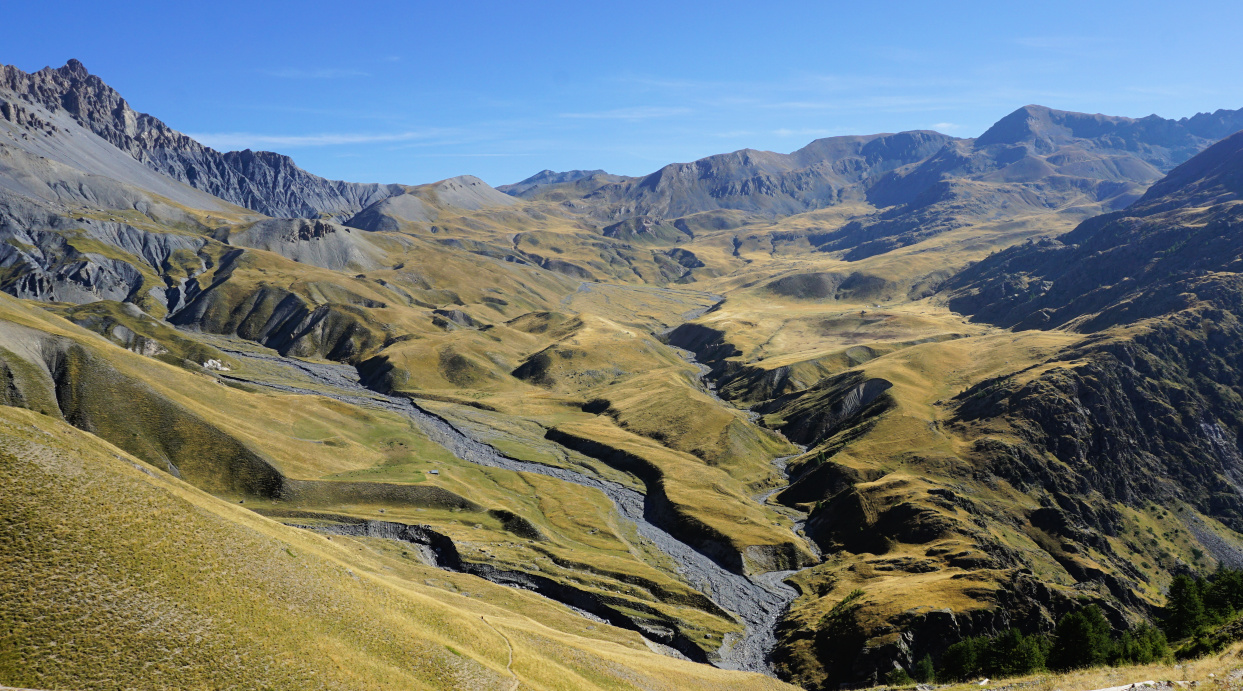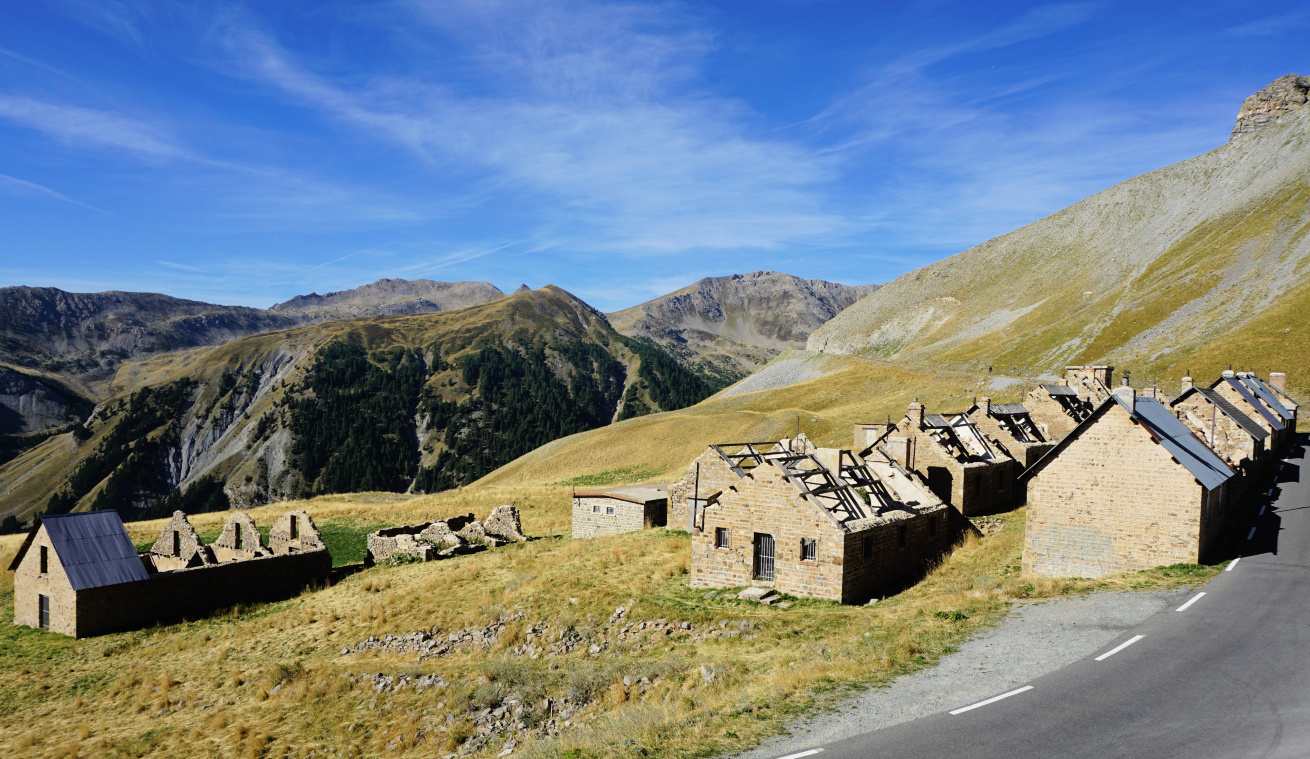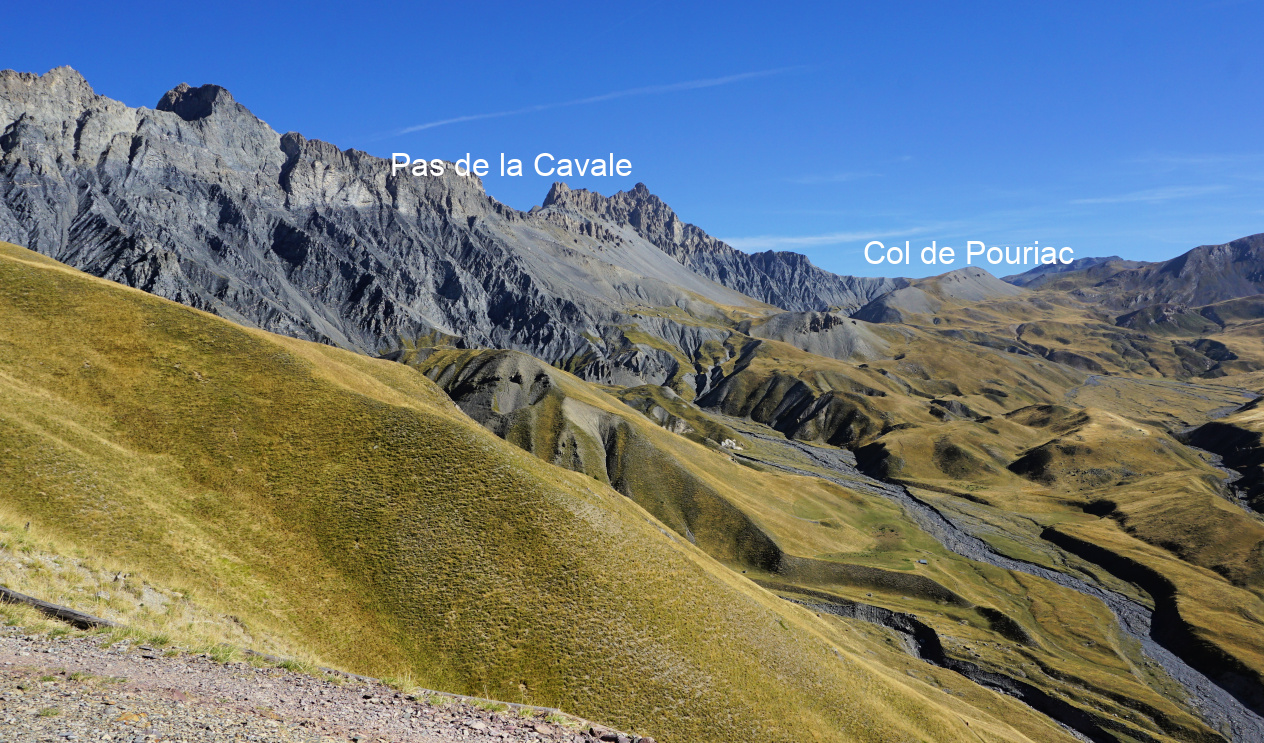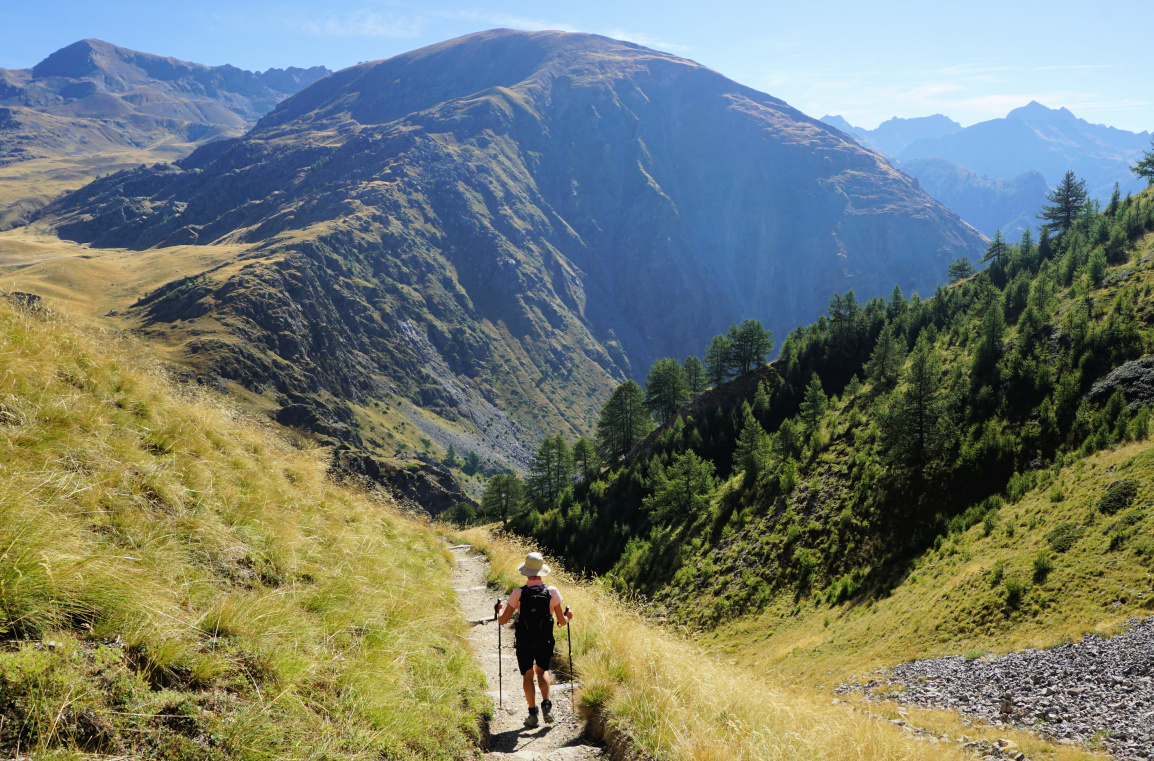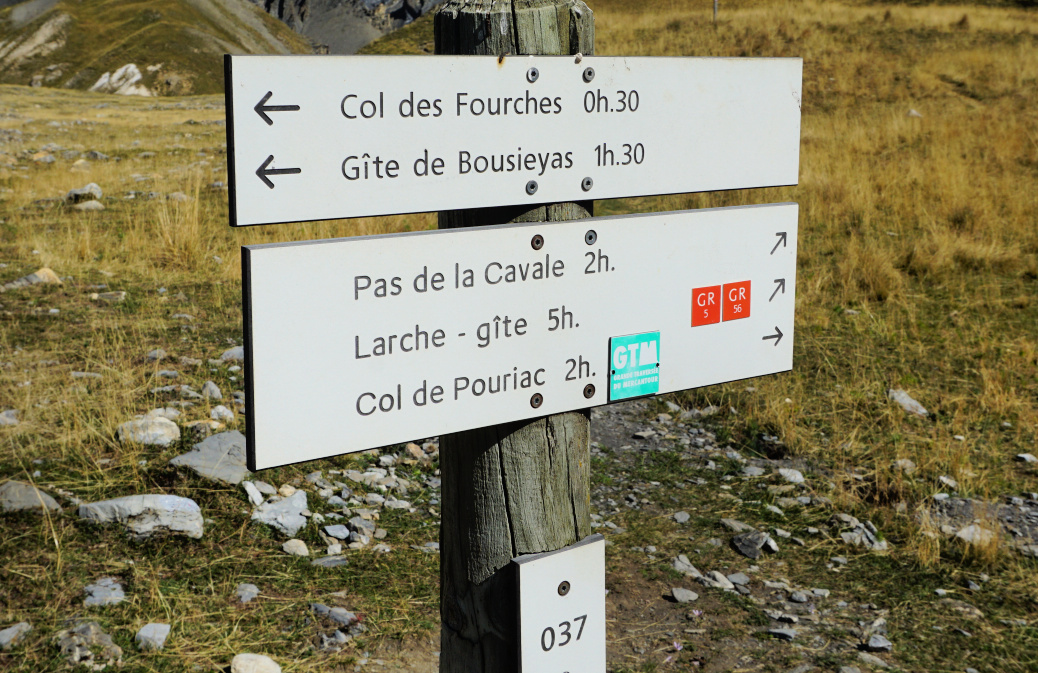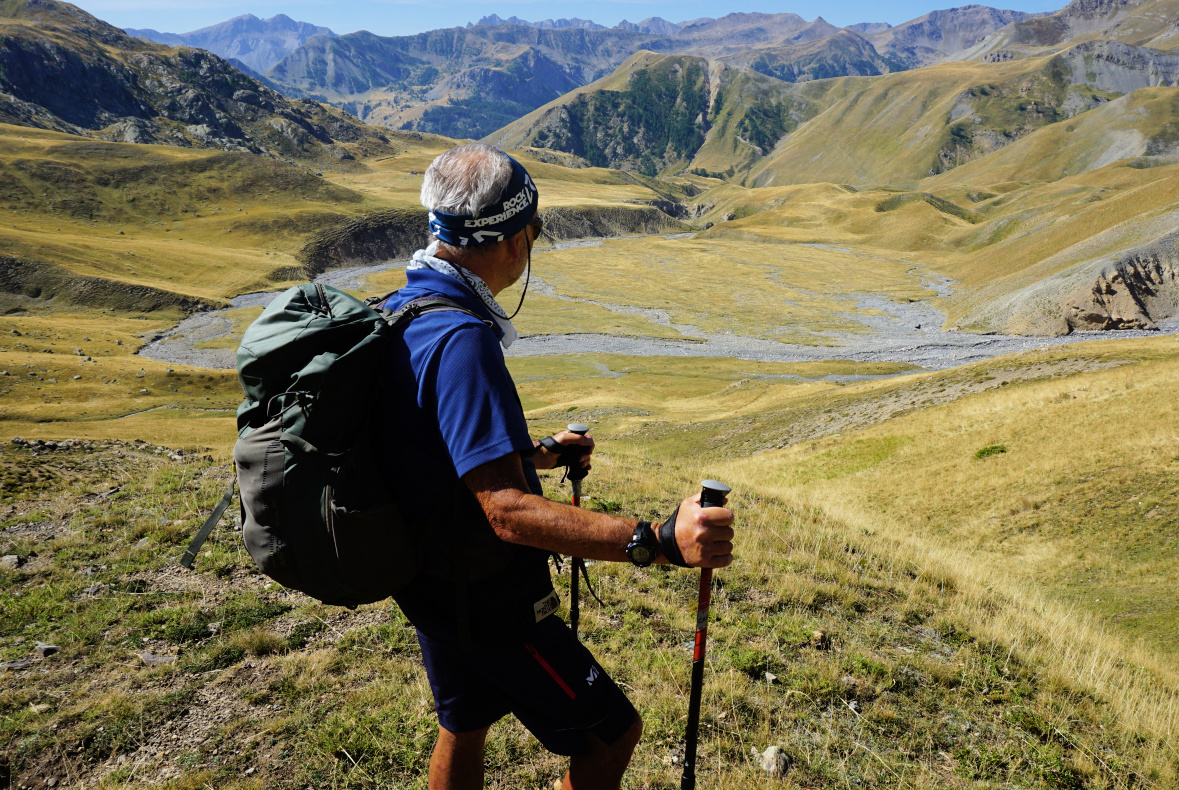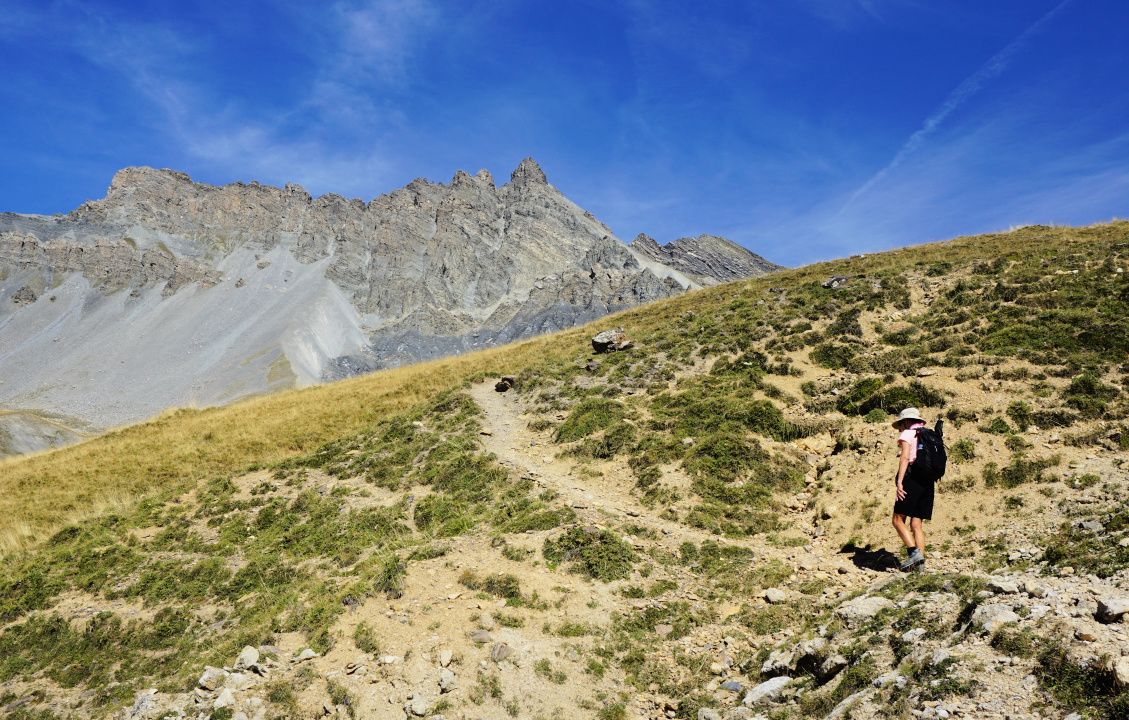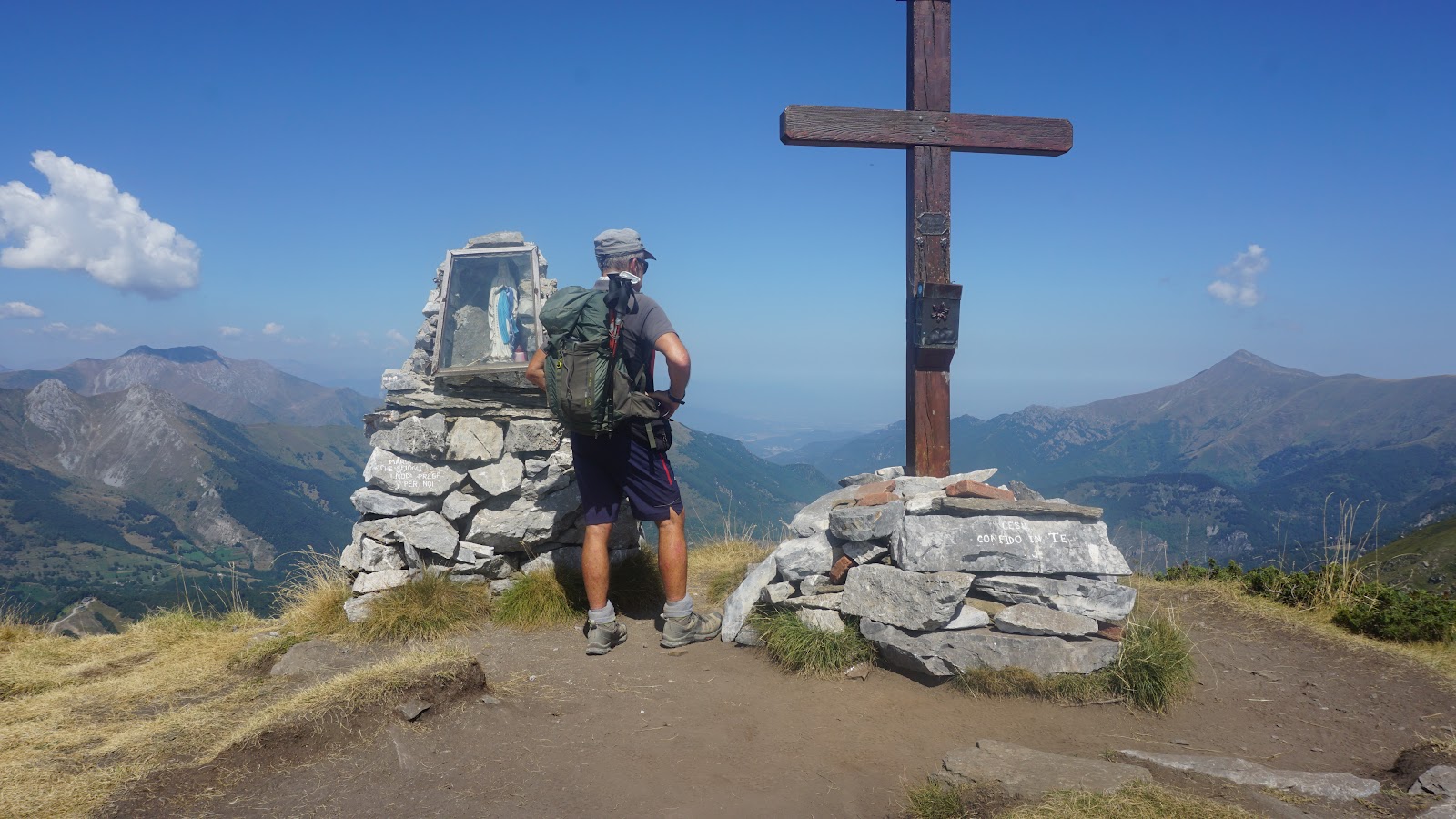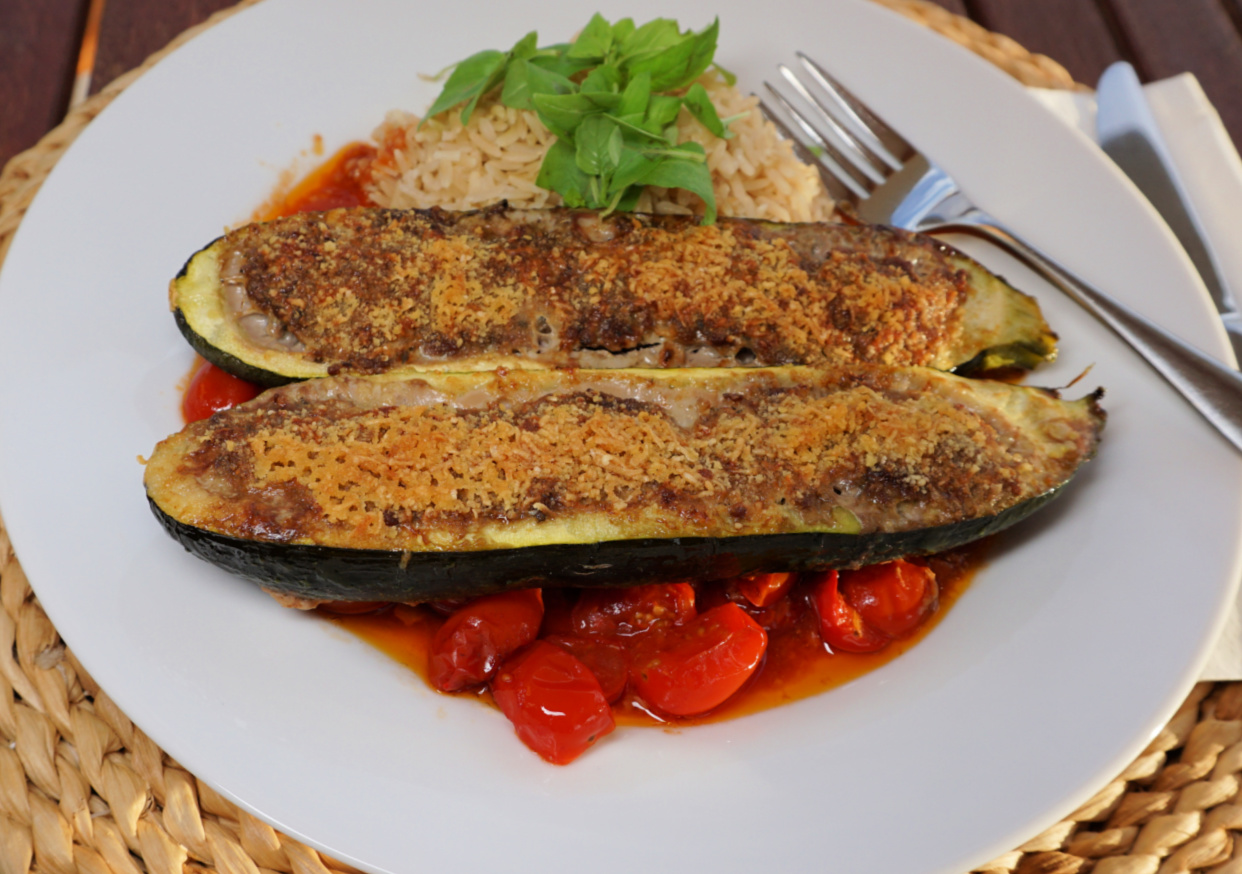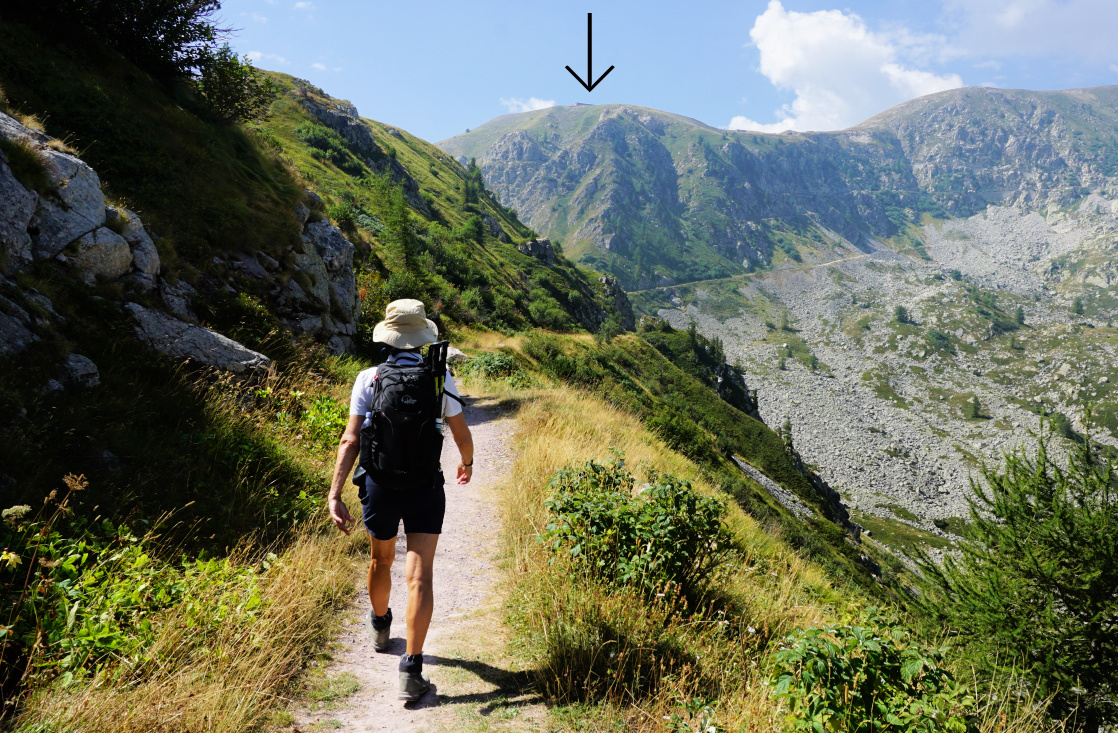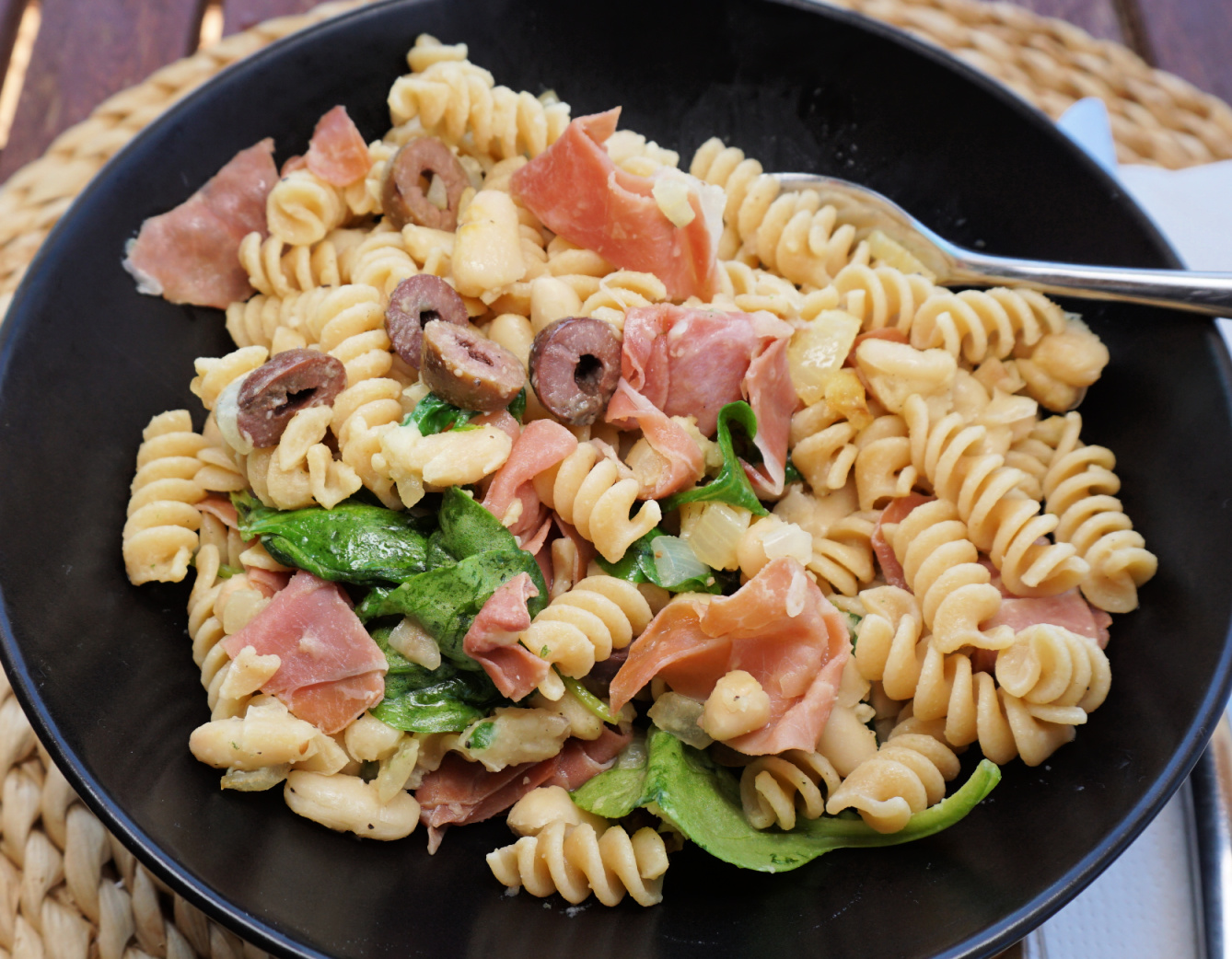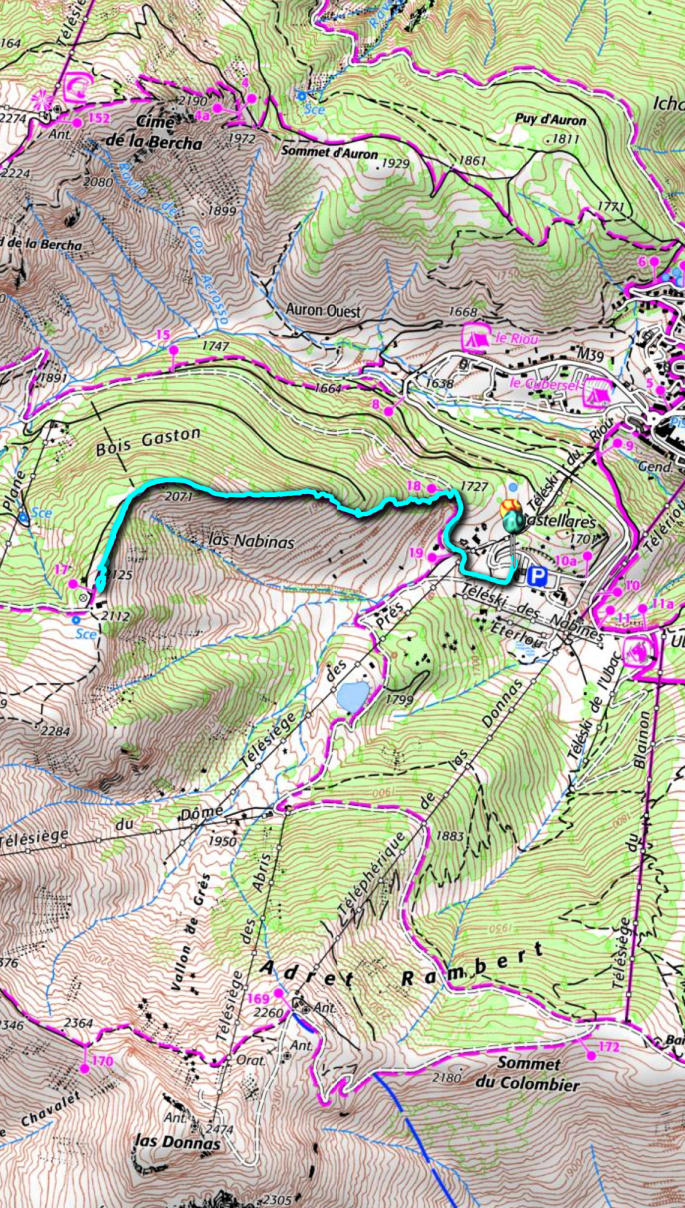This colourful salad plate with Italian antipasti flavours makes a nice lunch on a warm autumn day when the basil and local tomatoes are still in season.
The day before cook slices of courgette and red bell pepper in olive oil in a grill pan. Cover and let marinate overnight in refrigerator.
2 servings
4 slices of grilled and marinated red bell pepper
2 slices of grilled and marinated courgette
Olive oil
4 slices of cantaloupe melon
4 slices of Parma ham
2 tomatoes, chopped
8 black olives, pitted and sliced
About 250 g ricotta
2 handfuls of rocket
Freshly ground black pepper
Olive oil vinaigrette
Fresh basil to decorate
Place the chopped tomatoes in a bowl with 1 tbsp. of olive oil, and the sliced black olives. Mix and let marinate for a few minutes.
Divide the ricotta in a nice heap in the middle of the plates.
Arrange the grilled antipasti vegetables in one corner of the plates.
Divide the cantaloupe slices on the plates and top with Parma ham.
Place a heap of rocket in one corner of the plates and the marinated tomatoes in their corner.
Grind over some black pepper and sprinkle with olive oil vinaigrette. Decorate with basil. Serve with some good country bread for a balanced meal.
Stuffed bell peppers is a classic Mediterranean dish. The stuffing used to be made from ground lamb or a mixture of lamb and beef. Nowadays it could be made from vegetables and sausages or vegetables and some cheese.
In this recipe, the stuffing is a rich and thick Bolognese sauce made from beef, herbs, and tomato paste. The bell peppers are served on a bed of creamy orzo or other small shape pasta.
2 servings
2 large red bell peppers
Olive oil
Orzo for 2 servings
1 tbsp. crème fraiche 15 % fat or cream
For the Bolognese:
About 250 g ground lean beef
1 shallot, chopped
1 clove garlic, minced
olive oil
150 ml chicken stock
3 tbsp. organic tomato paste
1 tsp. dried Provençal herbs
Freshly ground black pepper
Chopped basil to decorate
Start with the Bolognese. Warm 2 tbsp. olive oil in a heavy sauté pan and lightly brown the ground meat. Add the shallot and garlic and continue sautéing for about 5 minutes.
Add the chicken stock, tomato paste, herbs, and black pepper and mix well. Let simmer for about 10 minutes.
Preheat the oven to 200° C roast.
Wash and dry the red bell peppers. Cut “hats” from the stem ends and remove the seeds. Fill the peppers with the Bolognese.
Oil a small oven-proof dish with olive oil. Place the bell peppers in the dish with their decorative “hats” on the side. Roast for 20- 30 minutes until the peppers are soft.
Meanwhile cook the orzo according to the advice on the package. When the pasta is done, drain it and return to the saucepan. Mix in the crème fraiche.
Divide the orzo on the plates and place the red bell peppers on top. Decorate with basil.
This delightful walk starts from the parking facing the harbourmaster’s
office, next to the Antibes old town.

|
|
Port and Fort Vauban
|
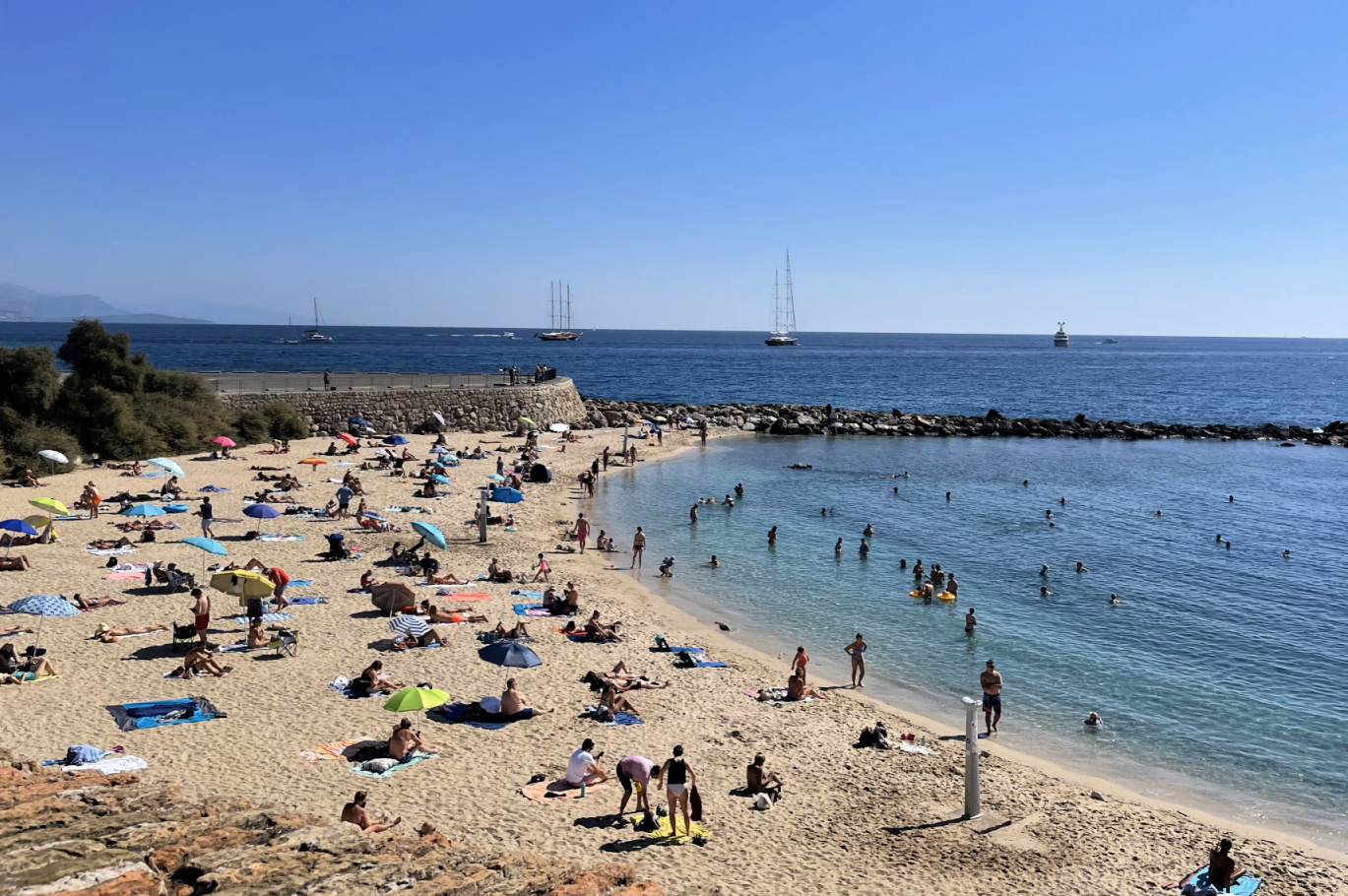
|
La Gravette Beach Antibes
|
We started along the seafront, passing the Picasso Museum then the
Albert 1er Square. We reached Plage du Ponteil where we
forked right, crossing the Ponteil Park and followed Boulevard du Cap then
Chemin des Sables over the peninsula to Juan-les-Pins. Juan-les-Pins is
today part of the City of Antibes.

|
| Antibes seafront |

|
|
La Pinède Juan les Pins
|
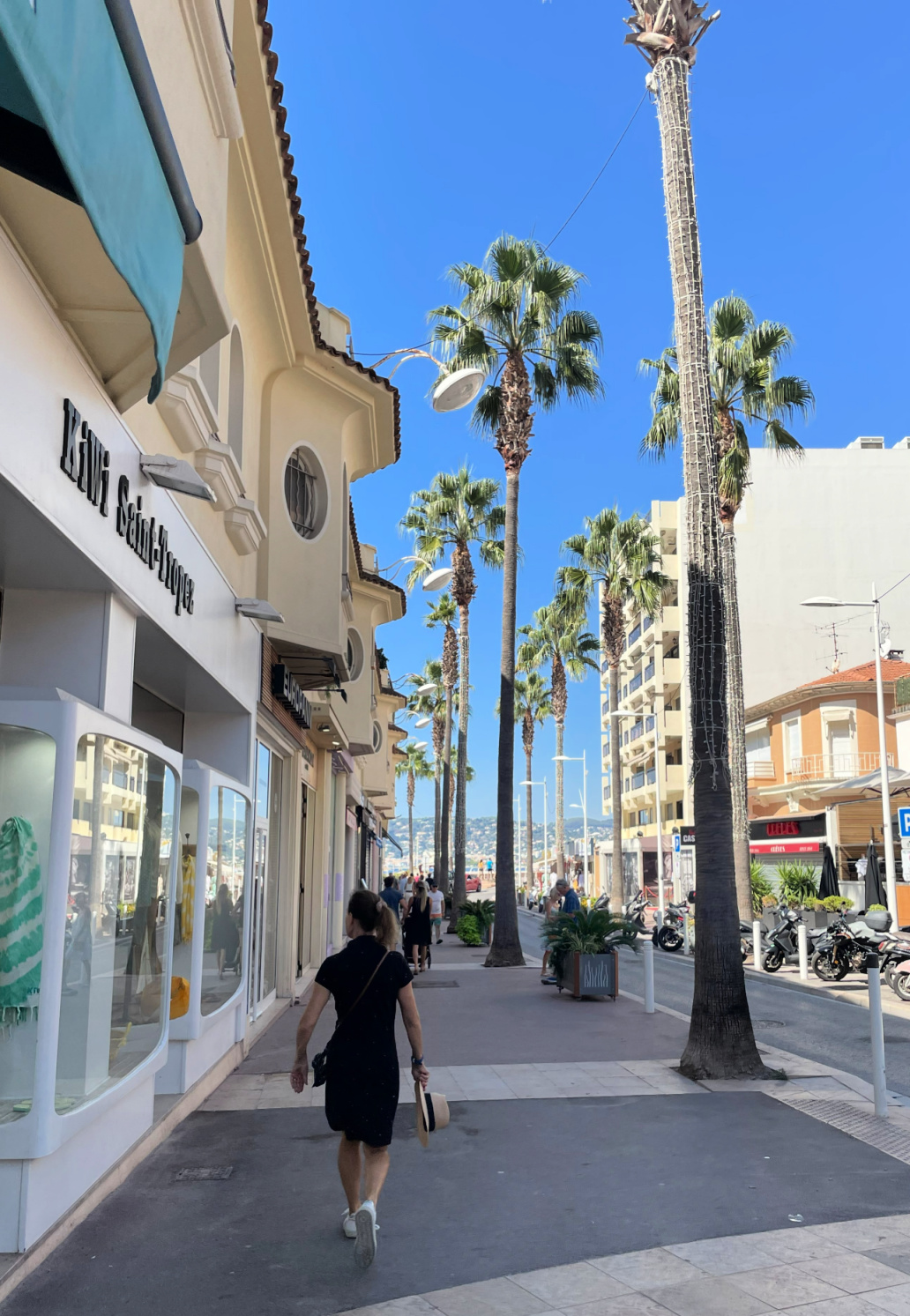
|
|
Av Georges Gallice Juan-les-Pins
|
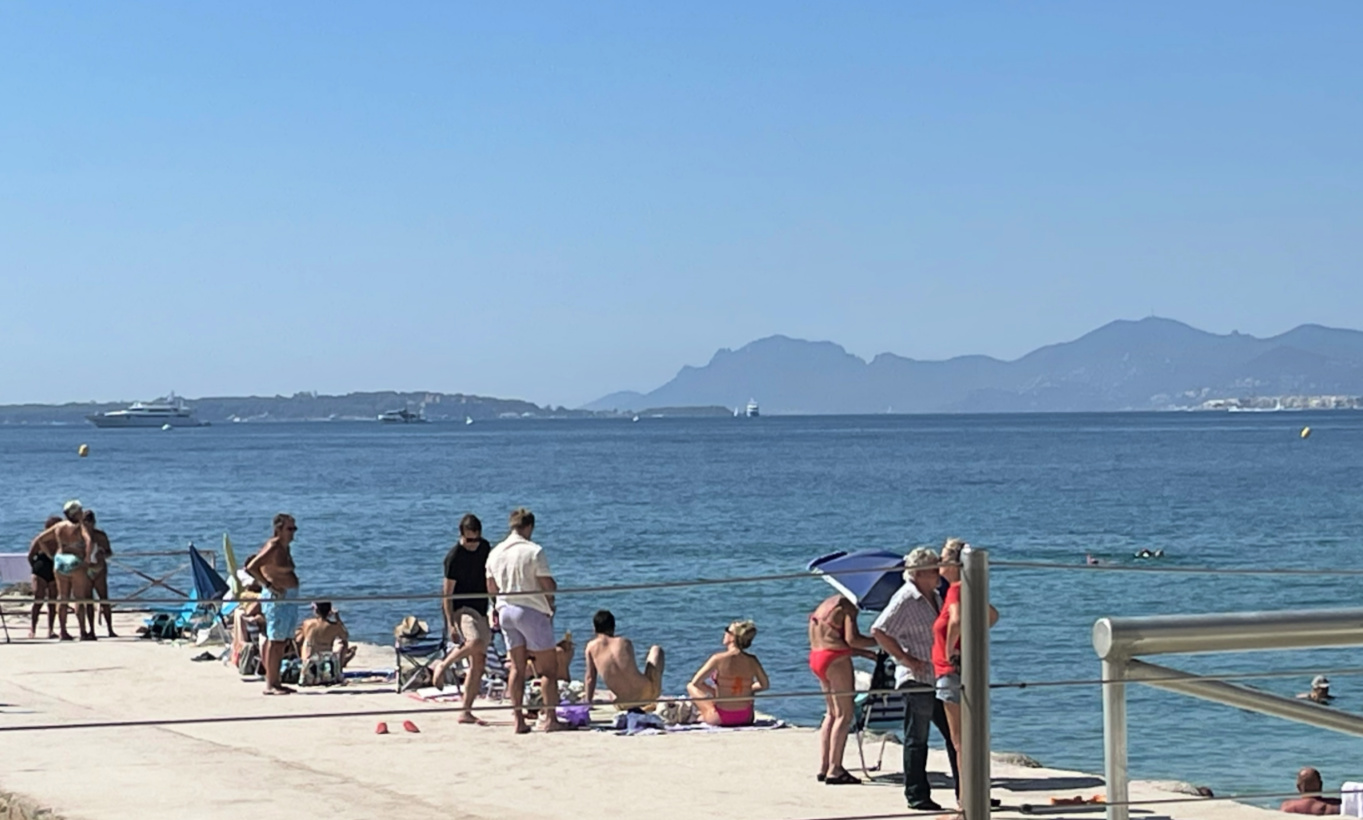
|
| Golf Juan |
We passed tranquil upscale residences before reaching Juan-les-Pins.
There was still a lot of activity on the warm early autumn day of our walk.
We walked through la Pinède where the renown jazz festival is held each
July.
Our timing was perfect for lunch at one of the restaurants facing Golf Juan,
with views towards the Esterel mountains and Lérins islands. Needless
to say, we chose seafood!
Distance: about 7,5 km ↔
Duration: about 2 h
Climb: about 55 m ↔
This recipe is inspired by a lunch we once had in
Bar des Oiseaux in Nice. There, the small cuttlefish was fried
with cooked orzo and some rocket leaves were added to the dish. Simple but
effective.
Because fresh small cuttlefish can be difficult to find I have replaced it
with a small package of frozen mixed seafood, Fruits de Mer. According
to the advice on the package, defrosted mixed seafood only need 4 minutes in a
hot frying pan. If you cannot find orzo, you can replace it with similar small
pasta shapes resembling large rice grains.
2 servings
Orzo for 2 servings
A small package, about 400 g, defrosted mixed seafood
1 shallot, chopped
1 clove garlic, minced
½ tsp. Piment d’Espelette or other mild chilli
3 tbsp. olive oil
2 handfuls of baby rocket leaves
Warm 2 tbsp. olive oil in a sauté pan over medium heat and cook the shallot
and garlic about 10 minutes until soft but not brown. With a slotted spoon,
remove from the pan and set aside.
Meanwhile cook and drain the orzo according to the advice on the package. Set
aside.
Add 1 more tbsp. olive oil in the sauté pan and increase the heat to
medium-high. Cook the defrosted seafood for 4 minutes stirring
frequently.
Add the orzo and Piment d’Espelette in the sauté pan and cook for a minute or
two stirring all the time until the orzo is well coated with oil.
Add the shallot, garlic, and rocket to the pan and mix well. Divide on the
plates and serve.
Limone Piemonte (1010 m) has preserved much of its charm as an upscale
Italian mountain resort.
On the day of our hike, a red warning for high temperature was effective in
the region. We took advantage of the Severino Bottero Gondola near our hotel.
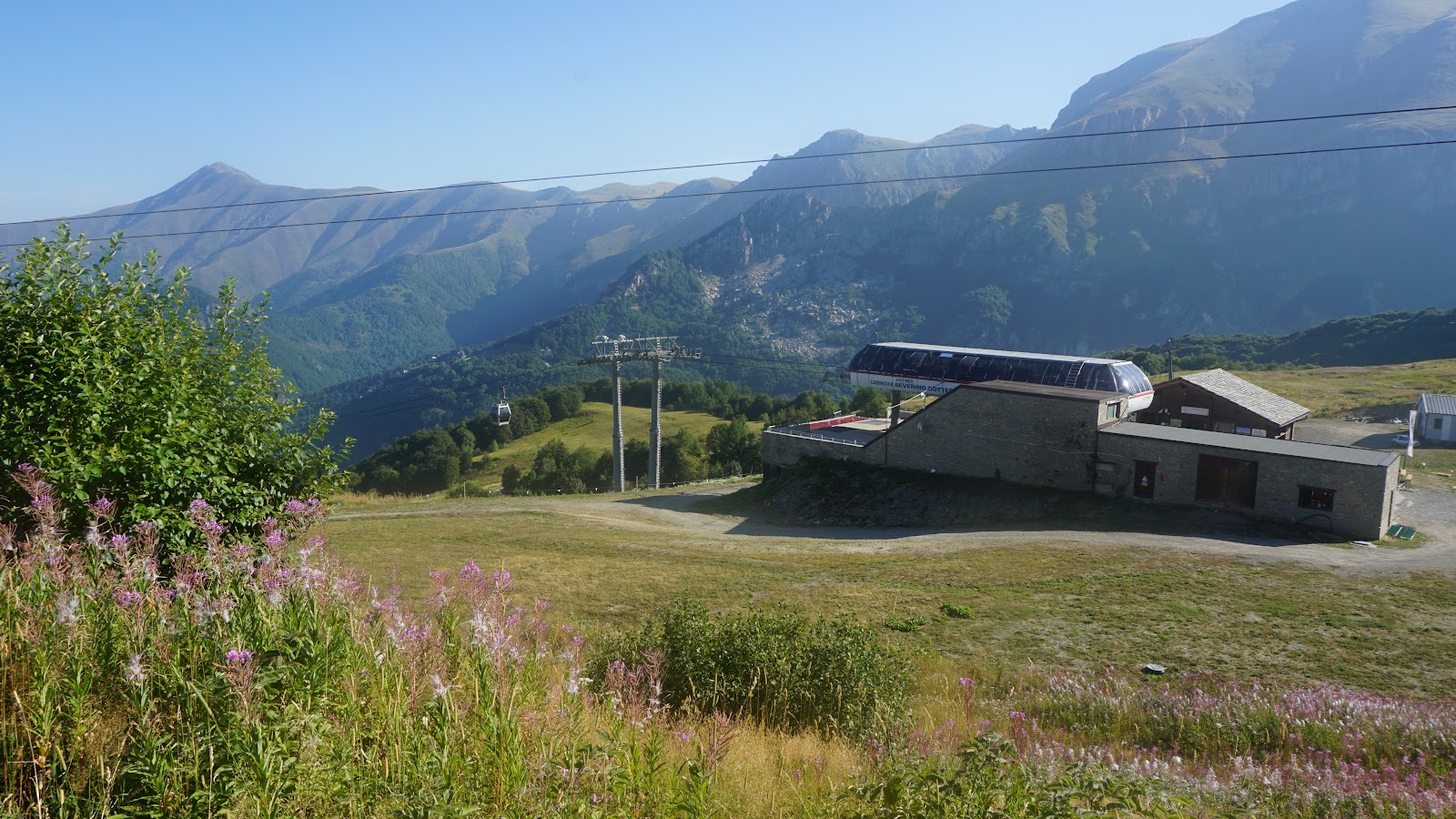
|
|
Bottero Gondola Limone
|
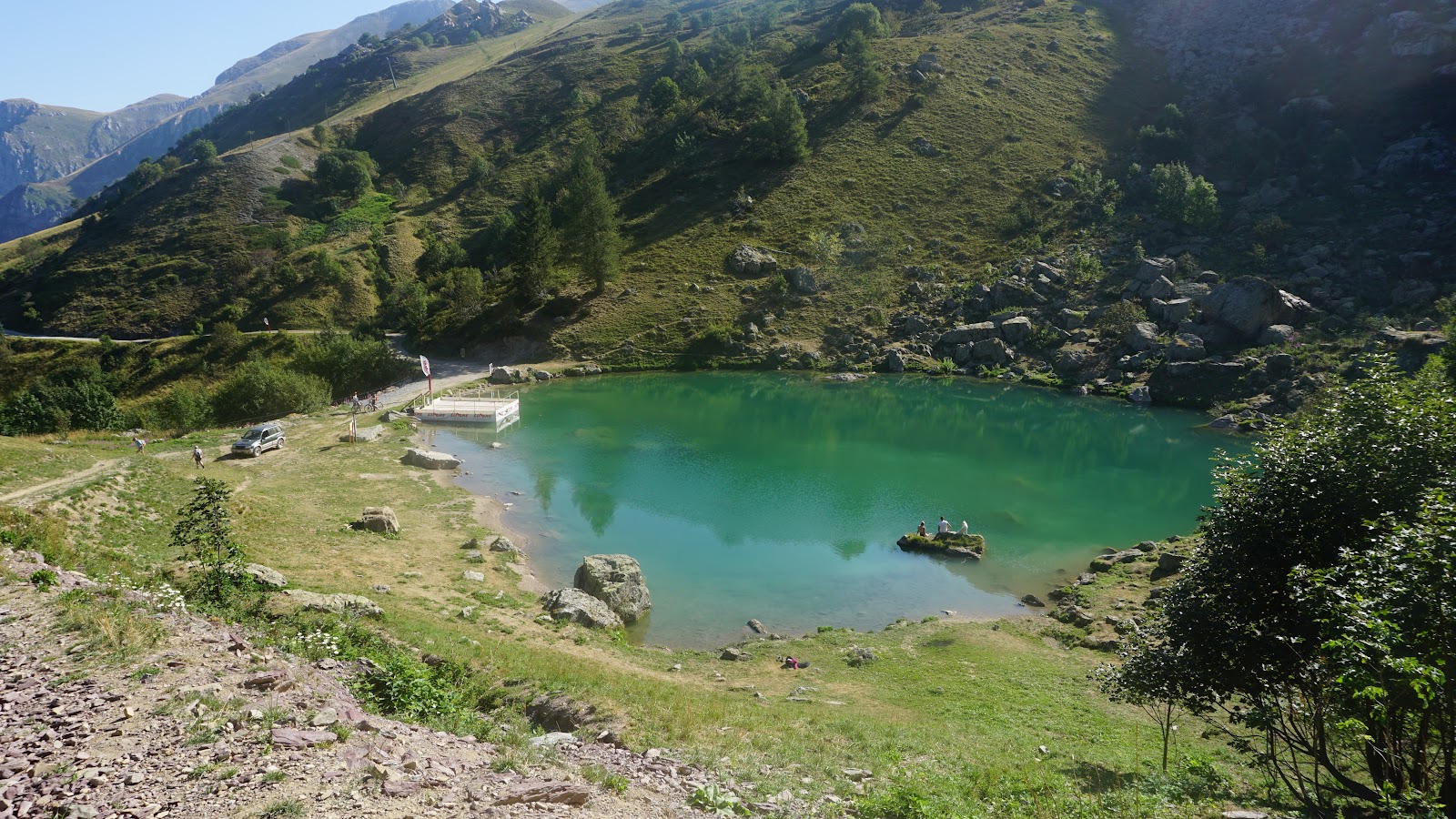
|
| Terrasole Lake |
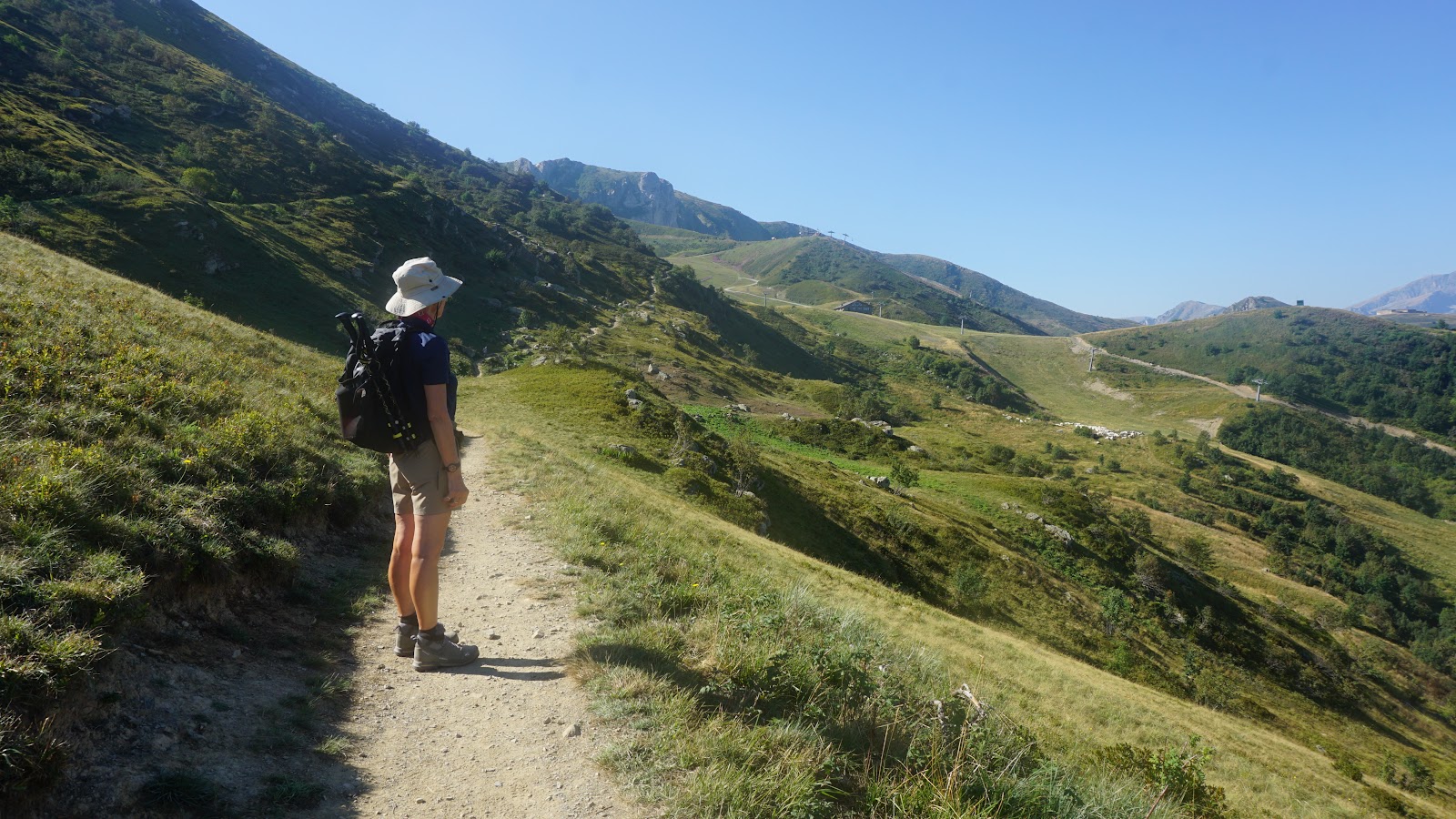
|
|
Trail after Terrasole Lake
|
With the gondola, we reached almost 1700 m, but with the clear skies the
temperature was nevertheless soaring. Our original plan was to ascend to the
French side of the border and proceed along the trail to Col de la Perle and
even beyond. Because this summer’s record heatwave, we had to modify both
the length and climb of the hike.
We climbed along a well-marked trail, first along ski runs then a good path
to Lake Terrasole, a popular spot for picnic etc. We ascended
a bit more, heading southwest outside of the ski runs before reaching a
mountain restaurant called Capanna Niculin, closed for summer.

|
|
Roche de l'Abisse in morning haze
|

|
|
Limone slopes in summer
|
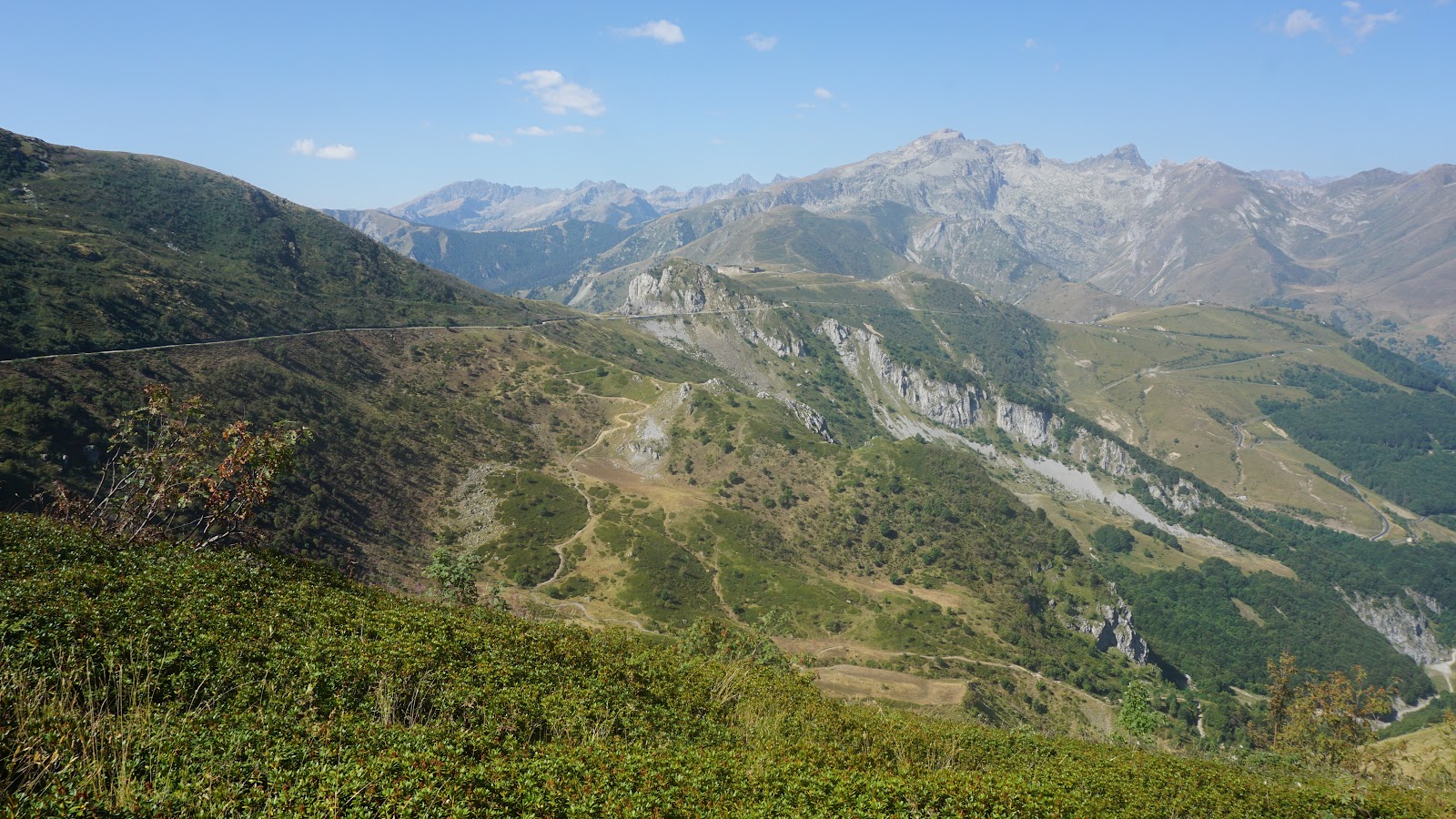
|
|
Fort Central in distance
|

|
| Above Baita2000 |
The next crossroads was above us. It was also the upper station of a chair
lift running from Limone 1400. The adjacent restaurant Baita 2000 was open.
The Upper Salt Road (Alta Via del Sale) ran here, and the day was busy. We
were able to hike a bit along a path before joining the dusty dirt track
shared by 4X4s, motorcycles, MTBs and hikers. We reached the
Campanin Pass (2142 m), still on the Italian side. We exited the dirt
road, and hiked southwest to the nearby border where we ascended to
Cime du Bec Roux (2214 m) with a cross overlooking Limone.
We decided to make this our turning point, and returned to the Bottero
Gondola, taking some shortcuts along the ski runs.
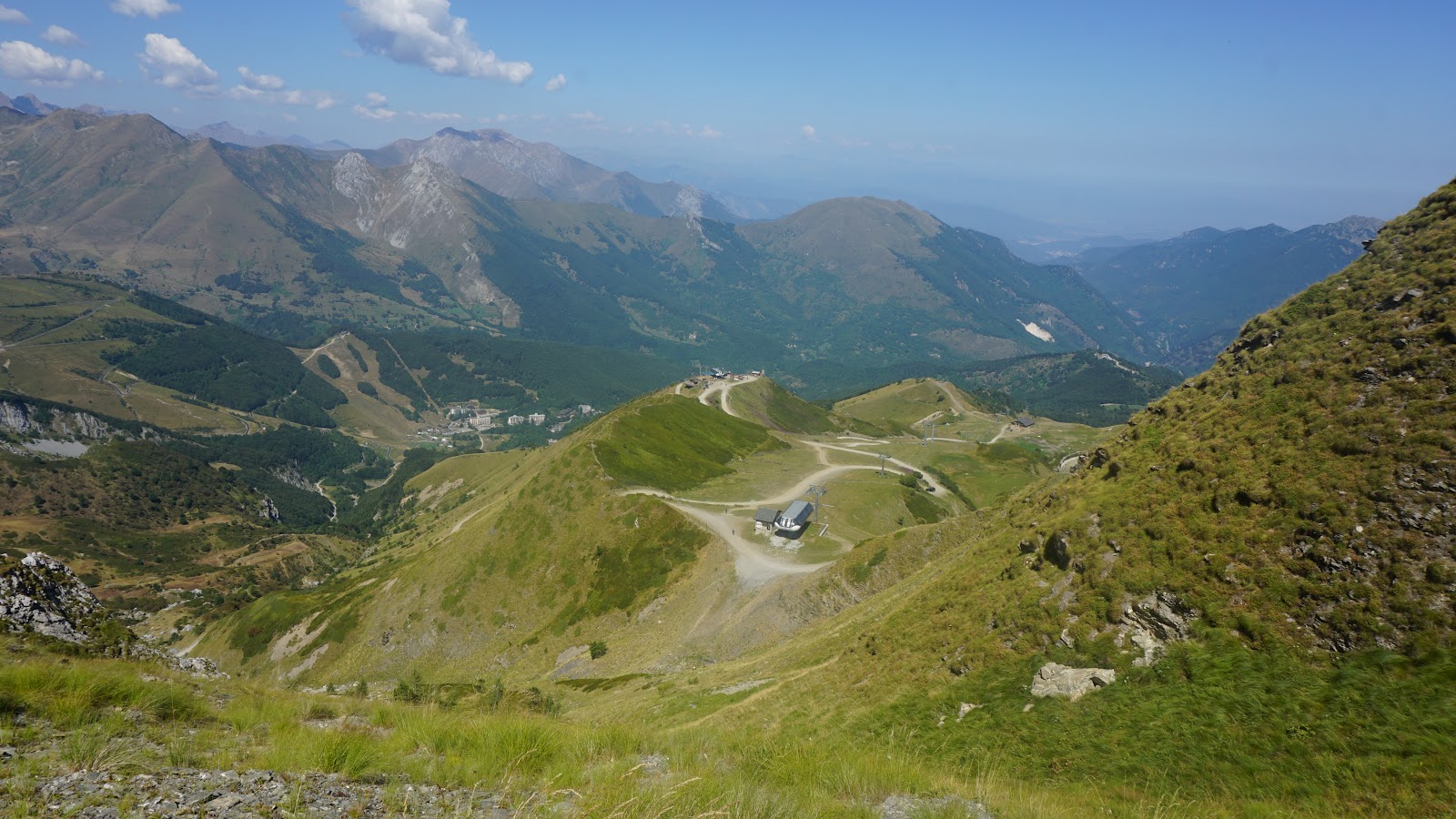
|
| Upper Salt Road |
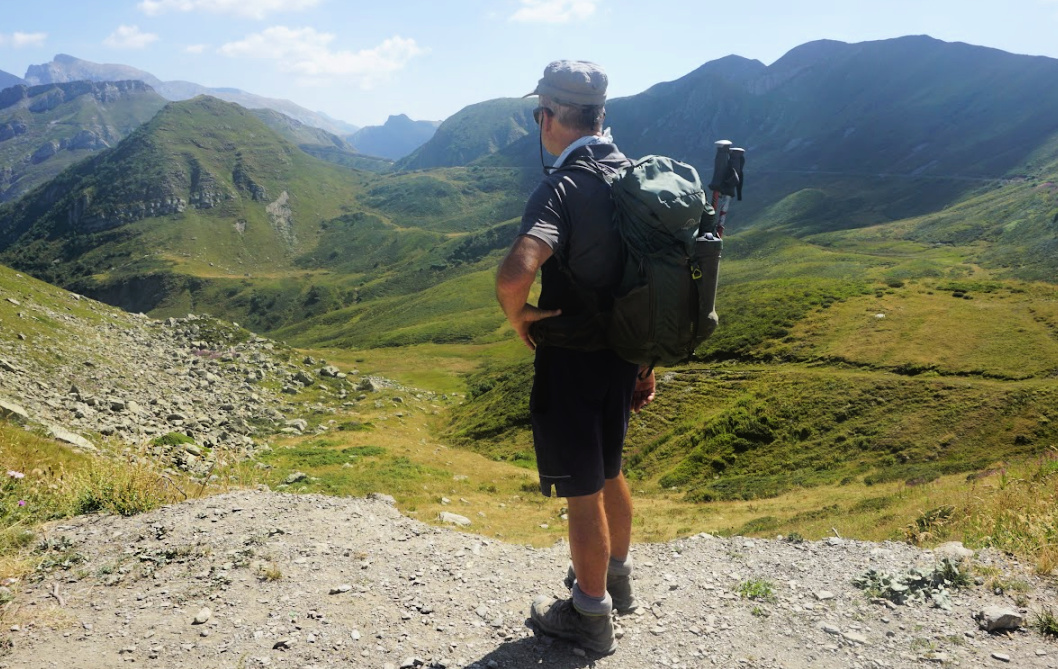
|
|
Campanin Pass 2142 m
|
Distance: 9,4 km
Climb: 560 m
Duration: 4h 15
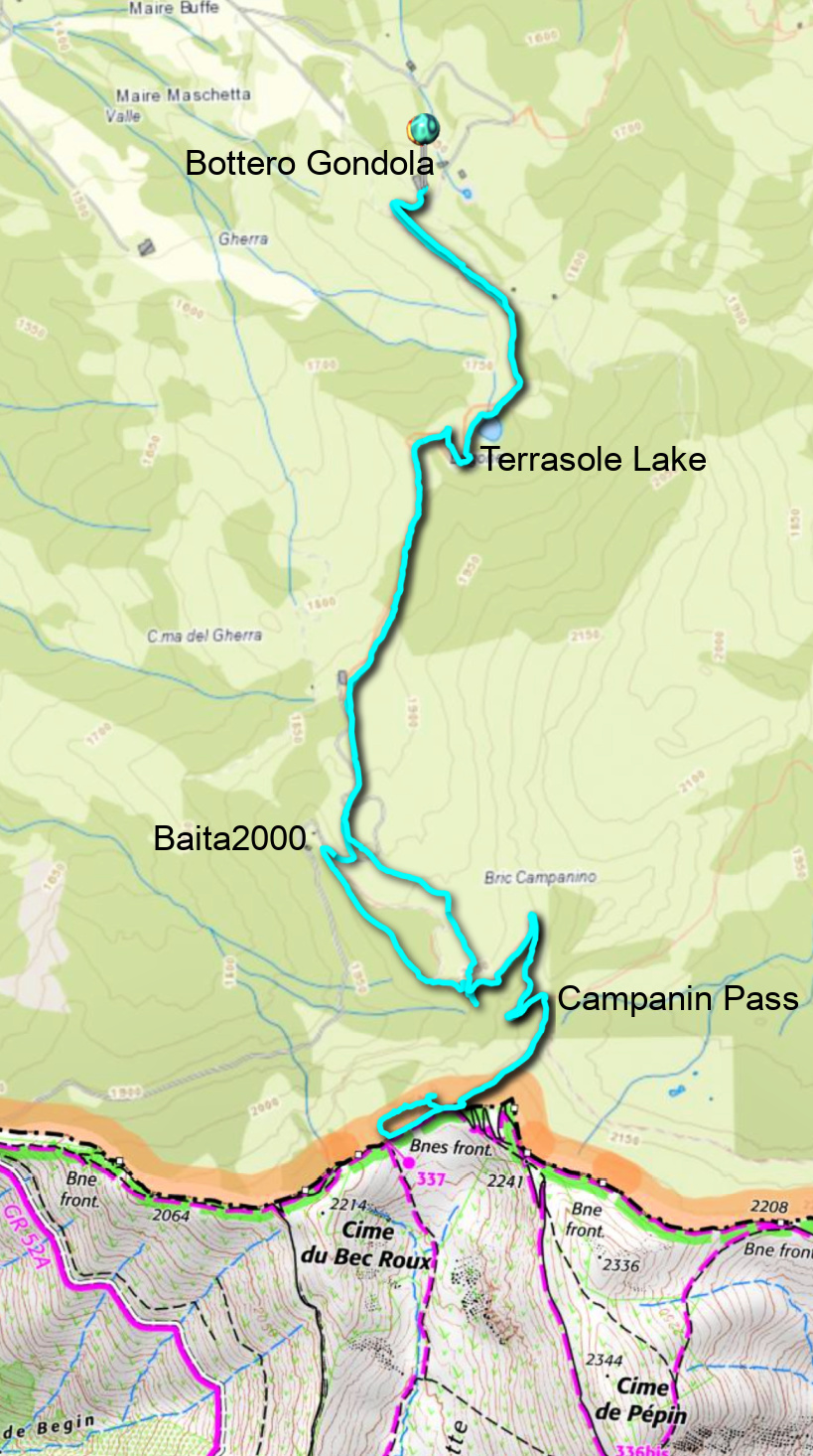
|
|
Limone to Cime du Bec Roux track
|
Small stuffed vegetables, Petits farcis, are a classic dish in Nice. But you can also choose to stuff larger vegetables one type at a time. The following recipe with a red wine and tomato sauce is perfect to make in autumn when we start craving dishes with stronger and more full-bodied tastes.
2 servings
about 250 g very lean ground beef, pref. 5% fat
2 courgettes
A handful of cherry tomatoes
1 shallot, chopped
1 clove garlic, minced
1 tsp. dried Provençal herbs
150 ml red wine
Olive oil
1 tbsp. tomato paste
1 tbsp. grated parmesan
1 tbsp. dried bread crumbs
1 egg
Freshly ground black pepper
Wash and dry the courgettes. Cut them in halves lengthwise and empty them with a melon scoop.
Make the stuffing by mixing the ground beef with egg, shallot, garlic, herbs, 2 tbsp. olive oil, and some ground black pepper.
Wash and halve the cherry tomatoes. Mix the tomato paste with the red wine.
Preheat the oven to 190° C, bake.
Spread 1 tbsp. olive oil in the bottom of an oven-proof dish. Pour the cherry tomato halves and the red wine- tomato- paste mixture in the dish.
Divide the stuffing in the courgettes and place them in the dish.
Mix the grated parmesan with the dried bread crumbs. Divide the mixture on top of the stuffing and sprinkle with some olive oil.
Cook in the oven about 45 minutes until the courgettes are soft. Then roast for 10 minutes in 210° C until the stuffing is golden brown.
Serve the stuffed courgettes with the tomato sauce and some brown rice.
According to some historians, the first road over the mountain pass of Tende,
Col de Tende, was constructed by Phoenicians and later maintained by Greeks and Romans.
In the 19th Century, numerous forts were erected on both sides of the col by
the Italians to protect the Piemont Region. By the end of the 19th Century, a
road and railway tunnel was constructed.
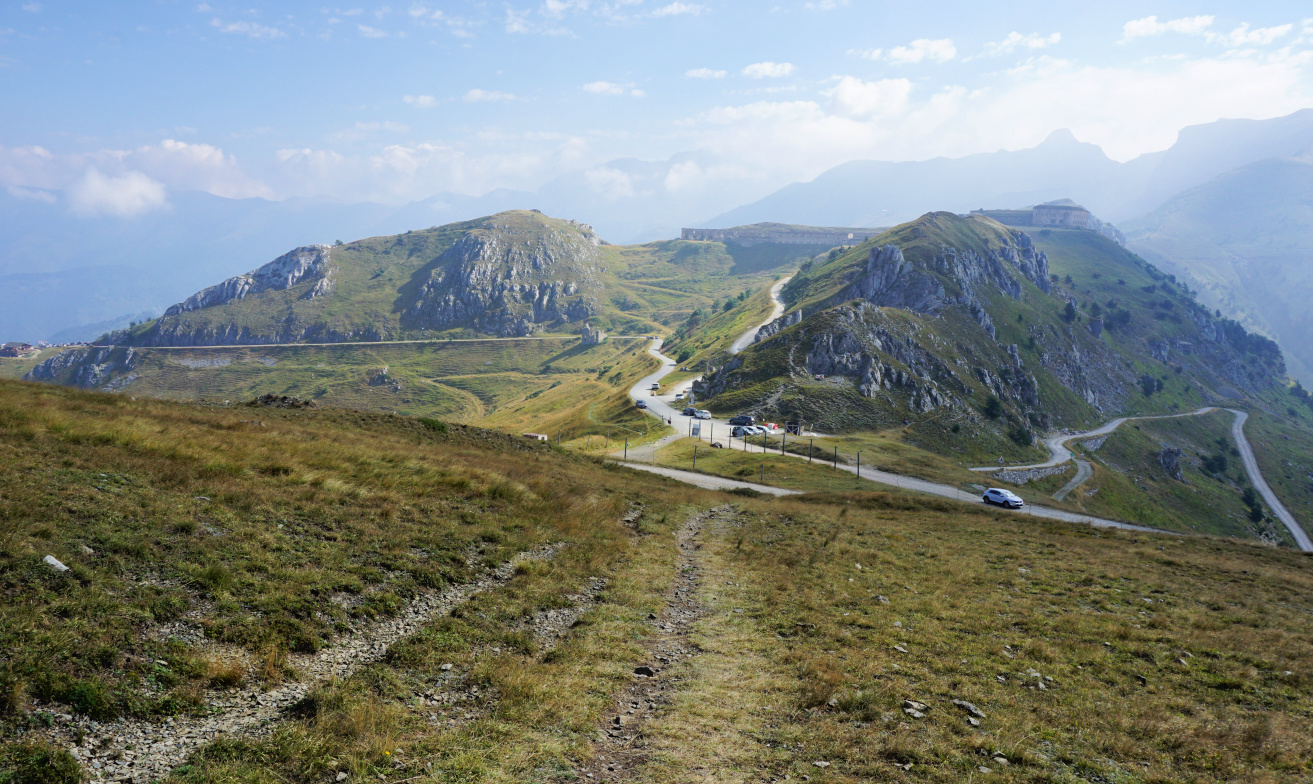
|
| Col de Tende |
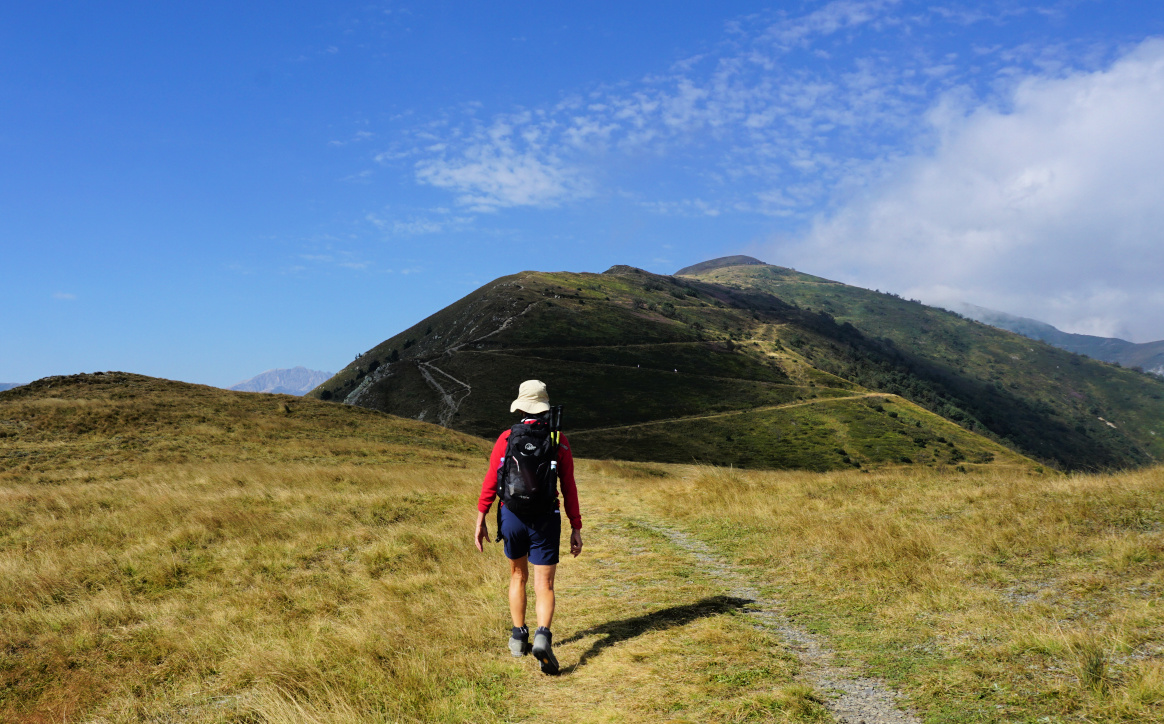
|
| Near Col de Tende |

|
|
Fort de la Marguerie
|
After the devastating storm Alex in October 2020, both the road and rail
connections were cut, and the road tunnel remains closed. Now it is possible to reach the pass by car from Casterino on
the French side using a narrow unpaved road best suitable for 4X4s. All the
others driving from Alpes Maritimes need to circle via Col de la
Lombarde above Isola2000 (as we did) or take the longer coastal route
via Imperia and Cuneo to reach Limone.
Having Limone as our base, we drove up along a paved road to Col de
Tende, Passo della Tenda (1871 m). It was a busy day, and the
dirt track to Casterino was used by numerous motorists including jeep safari
groups. We parked at the col proper a few 100 m past Chalet le Marmotte.

|
|
Under Fort Pernante
|

|
| Fort Pernante |
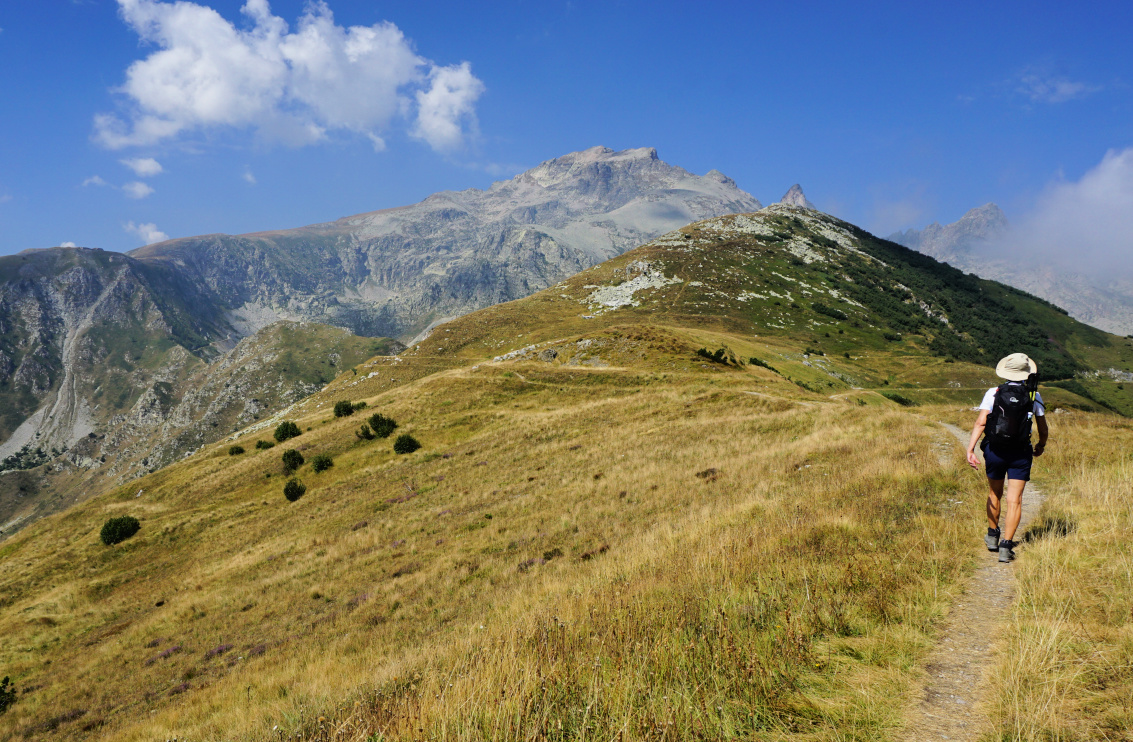
|
|
West of Fort Pernante
|

|
| Roche de l'Abisse |
Having hiked to the east from the col some years ago, we now wanted to
explore the itinerary to the west as far as to Fort de Giaure (2254
m).
From the col (signpost #340 on French maps), we climbed straight to Fort
Pernante (2119 m) along a narrow trail apparently marked for mountain bikers
as well. Fort de la Marguerie was well below us, next to the Casterino dirt
road. All the fortresses are today on the French side of the border. We
descended a bit, and hiked along the southern flank of Cime de Salante.
Our goal was visible in front of us, its northern flank very steep and
rocky. Maps advise to use the wide zigzagging old military trail. However,
we came to a sign showing “itineraire”. The original trail was blocked by a
rock slide higher up. We followed the instructions, and had to negotiate
some rocky stretches here as well before reaching a small lake, now dry. We
turned southeast and merged with the main trail above the rock slide. Some
parts before the fortress were narrow and exposed. At one point, a wire rope
was installed.
From the fortress, the panorama was excellent to both countries. From
signpost #380 west of the fort, one trail descended down to Casterino while
the other one ascended up to the nearby Roche de l’Abysse (2755 m).

|
|
Detour to Fort de Giaure
|
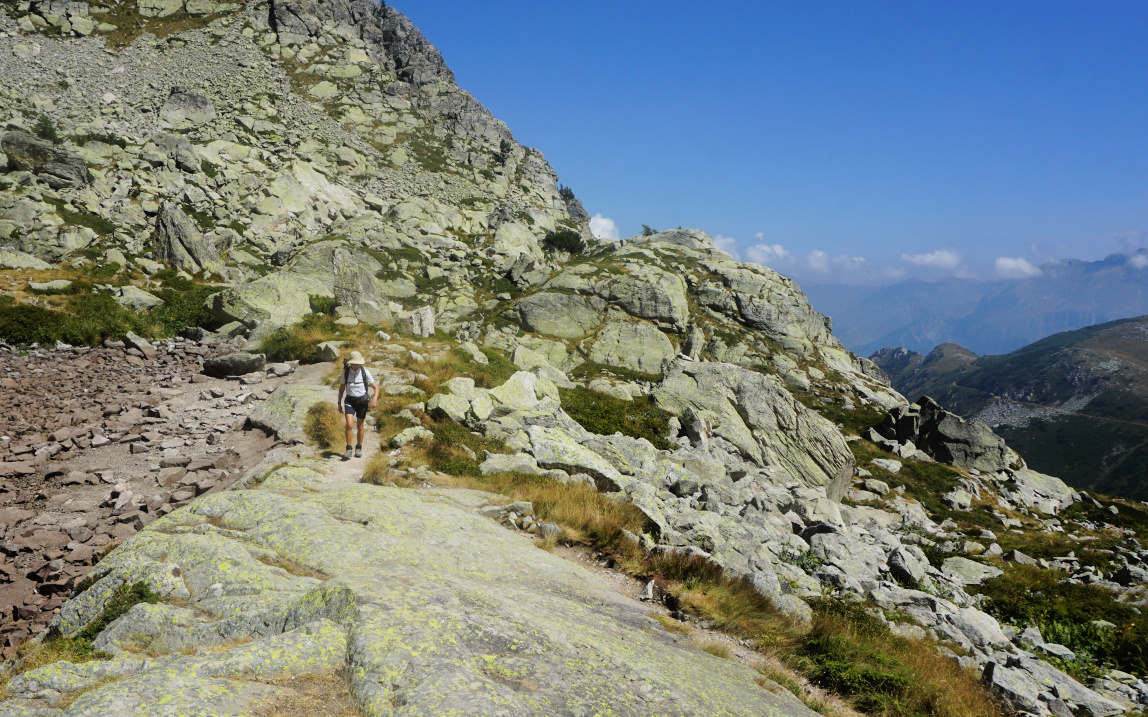
|
|
Detour trail higher up
|
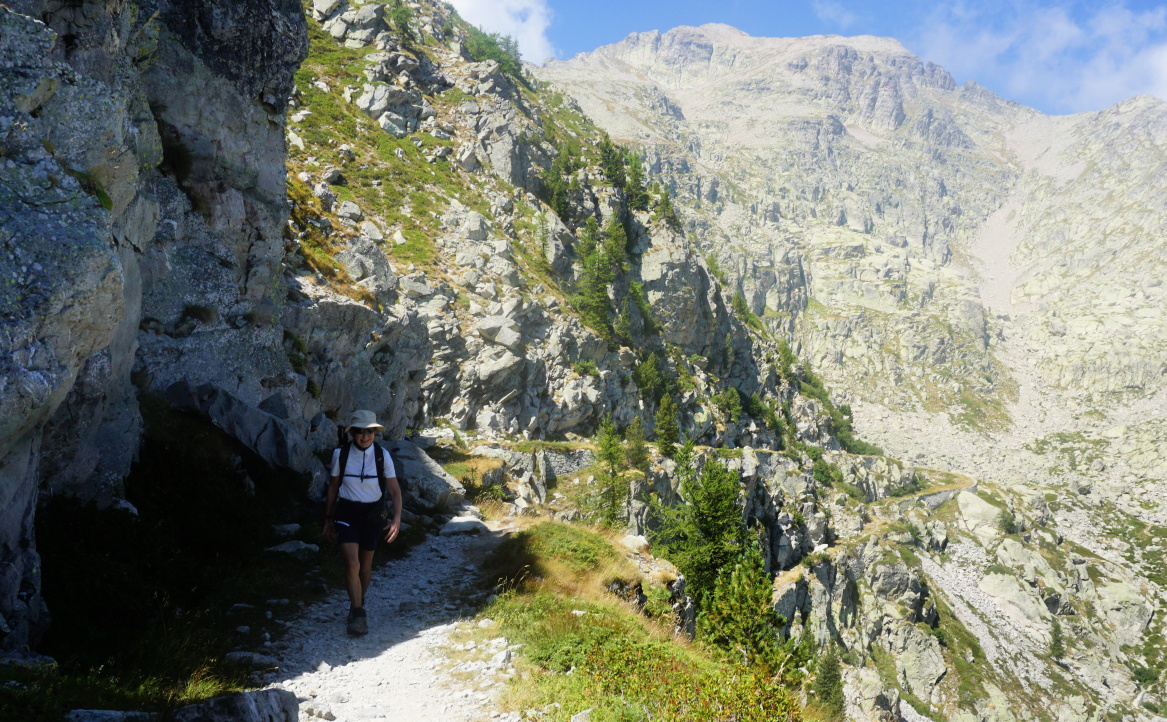
|
|
Exposed part of trail Fort Giaure
|

|
| At Fort de Giaure |
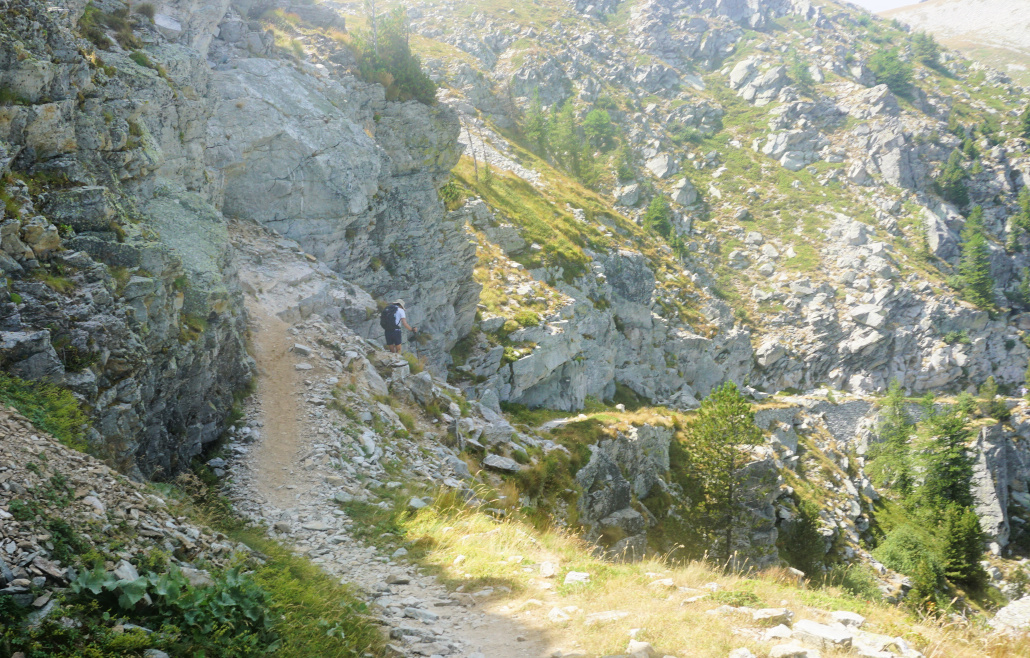
|
|
Narrow trail near Fort de Giaure
|
On the way back, we first used the same trail then a smooth quasi horizontal
trail circling north of Cime de Salante then north of Fort Pernante before
descending back to our starting point.
Distance: 11,5 km
Climb: ~500 m (inaccurate elevation data from two apps)
Duration: 4h 30
Map: 3841 OT Vallée de la Roya
This simple but satisfying dish makes a nice lunch or supper in autumn or winter. Any short pasta shapes such as fusilli or penne work in this recipe.
If you are in a hurry, use cooked white beans either from a jar or frozen white beans. The animal protein from prosciutto compliments the vegetable protein from beans.
For a colourful presentation, serve the dish in dark bowls.
2 servings
2 tbsp. olive oil
1 small onion, chopped
1 clove garlic, minced
About 200- 250 g cooked white beans
2 handfuls of baby spinach
4-5 slices of Prosciutto di Parma
About 8 black olives, sliced
Freshly ground black pepper
Whole wheat fusilli for 2 servings
Warm the olive oil over medium heat in a large sauté pan. Cook the onion and garlic for about 10 minutes until soft but not browned. Add the white beans to the pan. If using beans from a jar, rinse them under running water and drain before adding.
Cut the prosciutto into smaller pieces and add to the pan. Add the spinach and sliced olives. Grind over some black pepper.
Meanwhile cook the pasta according to the advice on the package. Drain, add to the pan and mix. Divide the dish into the bowls.
In Auron, we wanted to explore a less frequented trail on a picturesque ridge, Crête de Bois Gaston. It turned out to be a good and efficient morning exercise.
 |
| Sauma Longa viewed from Auron |
 |
| Start in Bois Gaston |
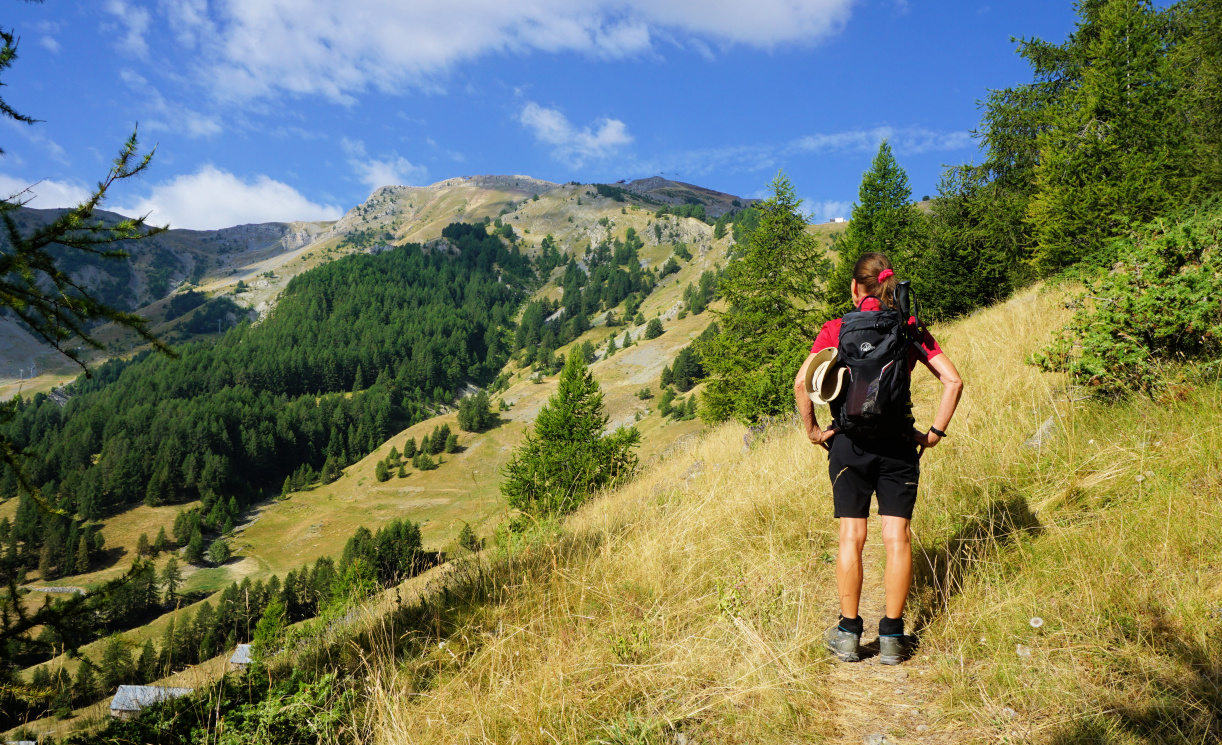 |
| Bois Gaston Ridge |
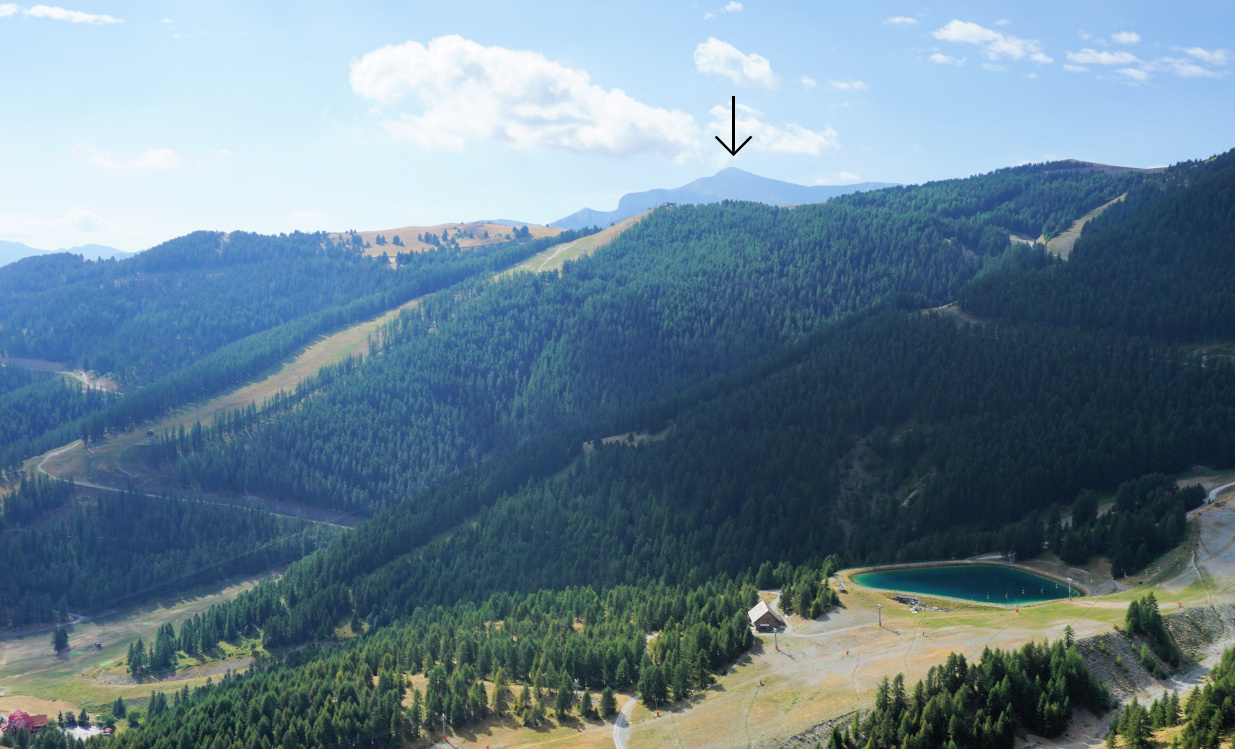 |
| Mont Mounier in the south |
We drove to the upper large paved parking (~1650 m) which was almost empty. We walked along a wide dirt track (easy ski slope in winter) to signpost #18, forked left and started to climb in Bois Gaston which mainly comprised a larch wood. The trail was good but very steep and in fact climbed continuously about 400 m before levelling off. Higher up, clearings gave us some very nice views down to Auron. Mont Mounier became visible in the south.
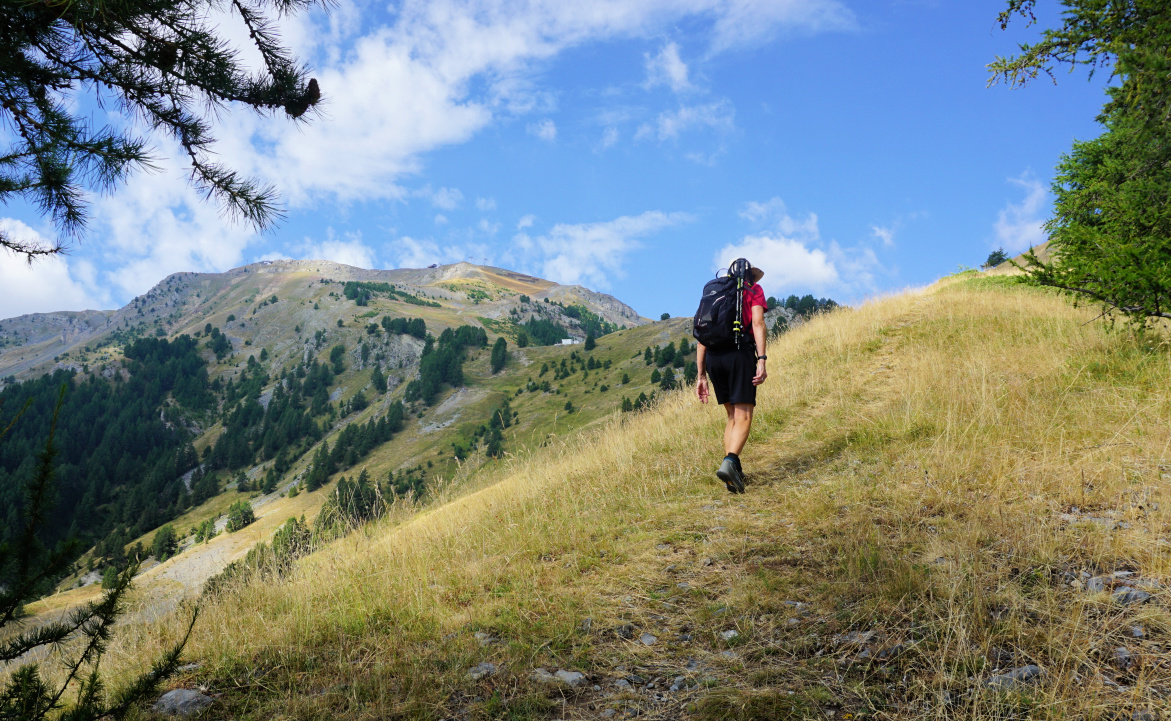 |
| Bois Gaston Ridge higher up |
 |
| Tinée Valley in morning haze |
 |
| Mont Tenibre and Corborant |
 |
| Bois Gaston Ridge steep trail |
At about 2070 m, the trail (yellow markings but only here and there) turned left (southwest) and we briefly entered a wood before reaching 2125 m and the ridge next to Sauma Longa (or Sauma Longue; signpost # 17), a small wintertime mountain restaurant now deserted.
We returned along the same trail.
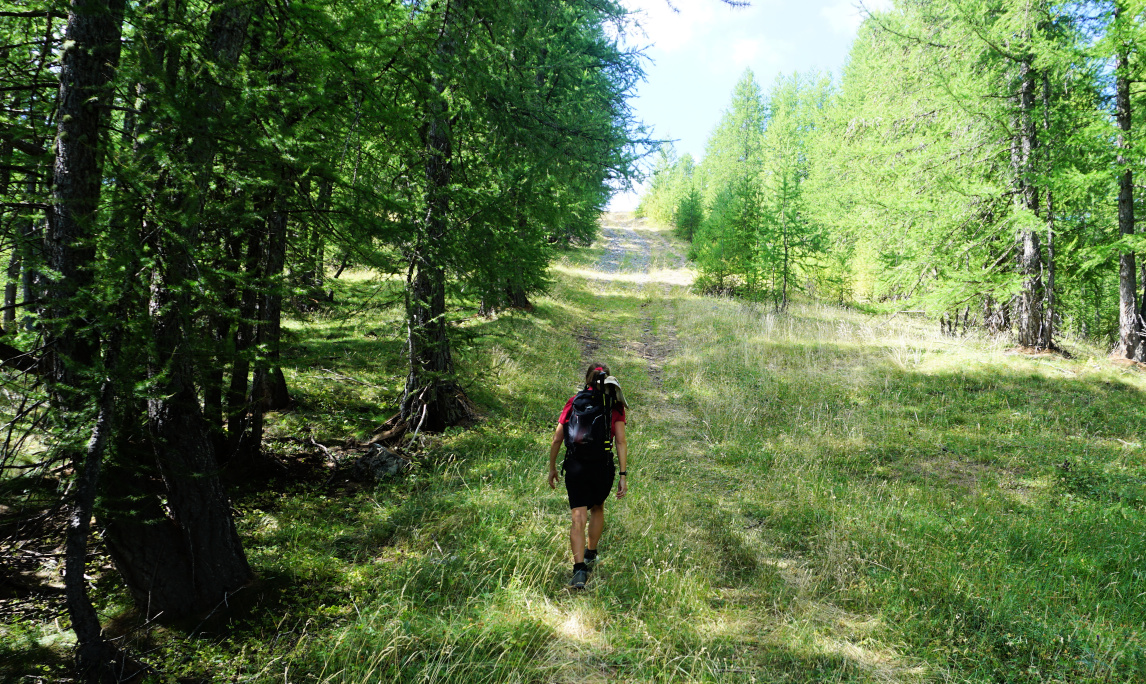 |
| Last push to Sauma Longa |
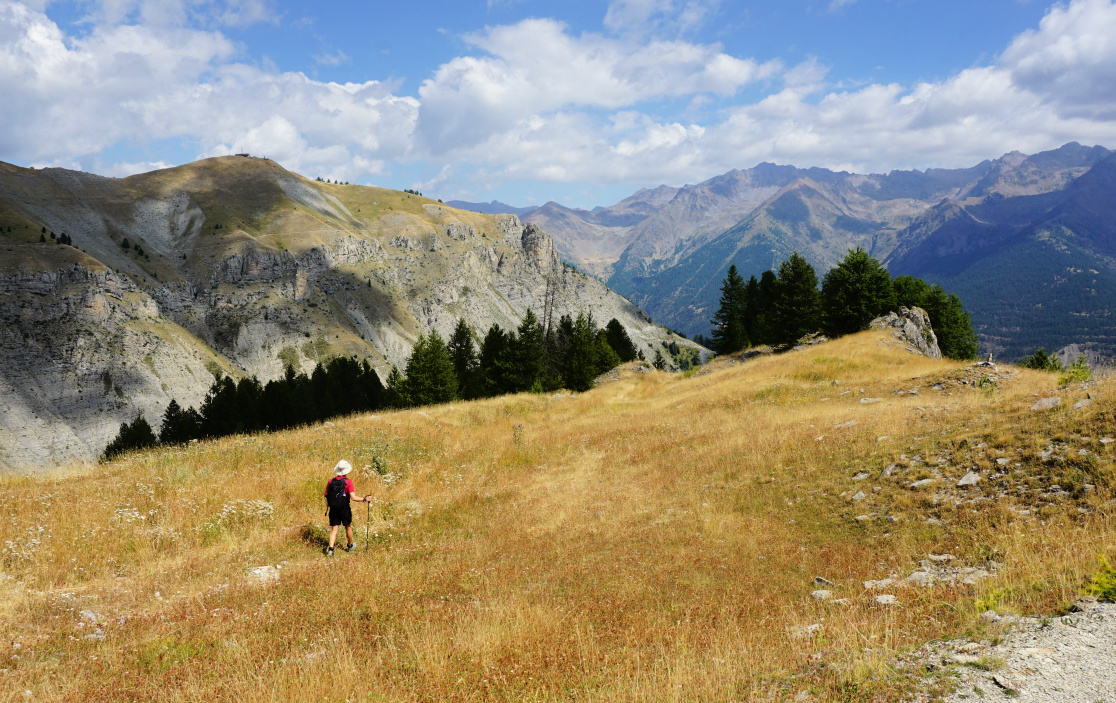 |
| Near Sauma Longa |
Climb: 474 m
Distance: 4,7 km
Duration: 2h 40 active
Map: 3639 OT Haute Tinée 1 Auron


